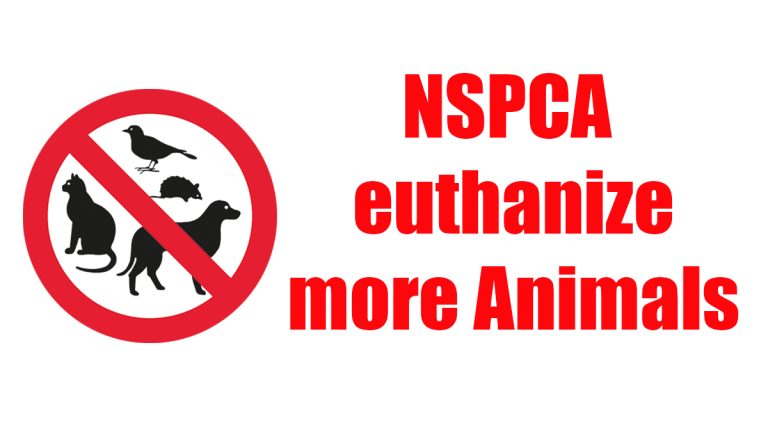
The National Council of SPCA’s (NSPCA) has swooped onto the Highveld Ridge SPCA (HRSPCA) and euthanized another 63 animals after visiting the HRSPCA on 30 Nov and 1 Dec 2023. The visit in 2023 resulted in the death of 114 animals.
The reasons given for the latest death spree were suspect according to information made available to The Bulletin. The NSCPA will of course claim that the HRSPCA is operating autonomously from the NSPCA and that they were to blame for the death of 177 animals, the amount euthanised by the NSPCA.
The Bulletin visited the HRSPCA after a tipoff that the NSPCA are at the kennels. This escalated into a very hostile confrontation very quickly that has now resulted in the NSPCA, and by association the HRSPCA being evicted from the premises.
The NSCPA inspectors turned out to be hostile and aggressive and tried to order The Bulletin from the premises, even though they had no legal right to do so as they had no agreement with the owners of the land. During a serious confrontation, an inspector approached me and after writing a “Right of admission” sign ordered The Bulletin from the premises. I refused of course. She grabbed my phone and I took it back during a shuffle. Another inspector tried to manhandle me but quickly stopped when he realised he might not be victorious (or so I presume)
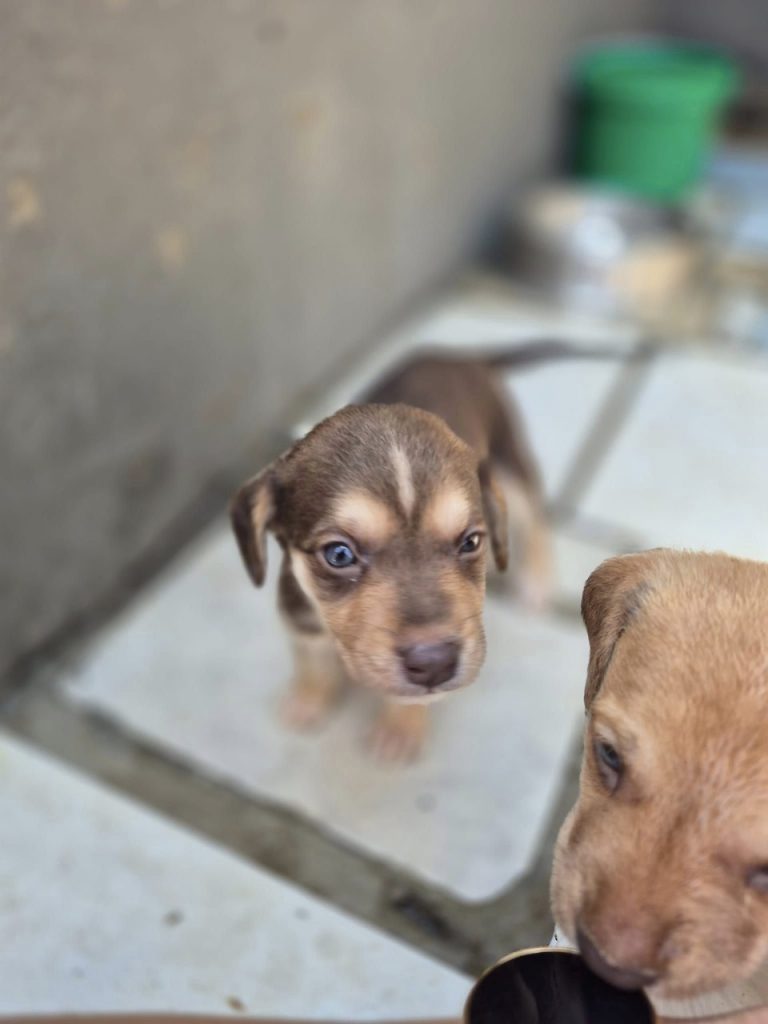
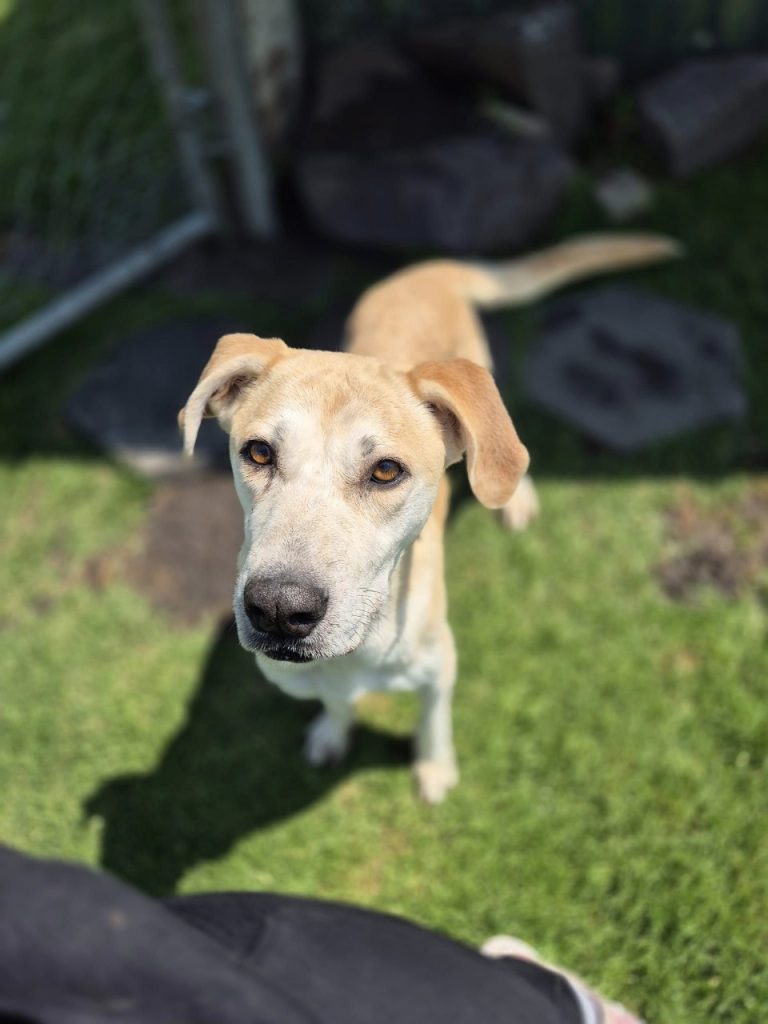
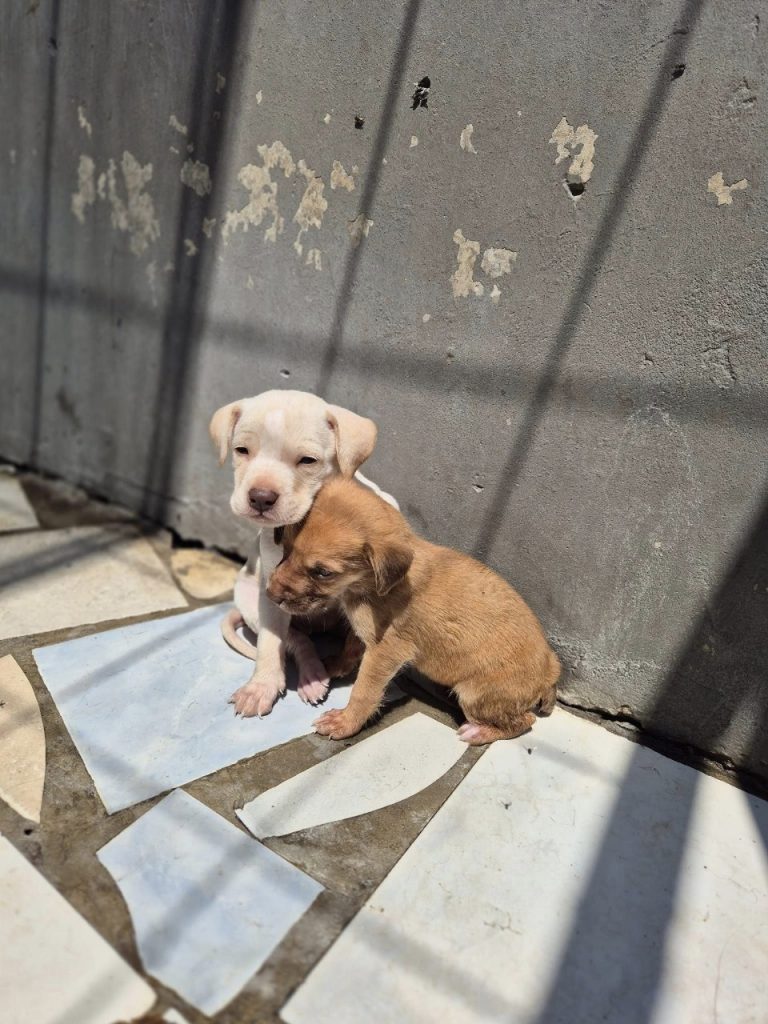
Every question as to the reason for their presence at the kennels was met with referrals to the liaison department. This is the same department that refused to give me clear answers when we reported on Inspector Jenneth Geel shooting a baboon nor did they respond adequately when I reported on the killing of two horses and the eating of goats and pigs.
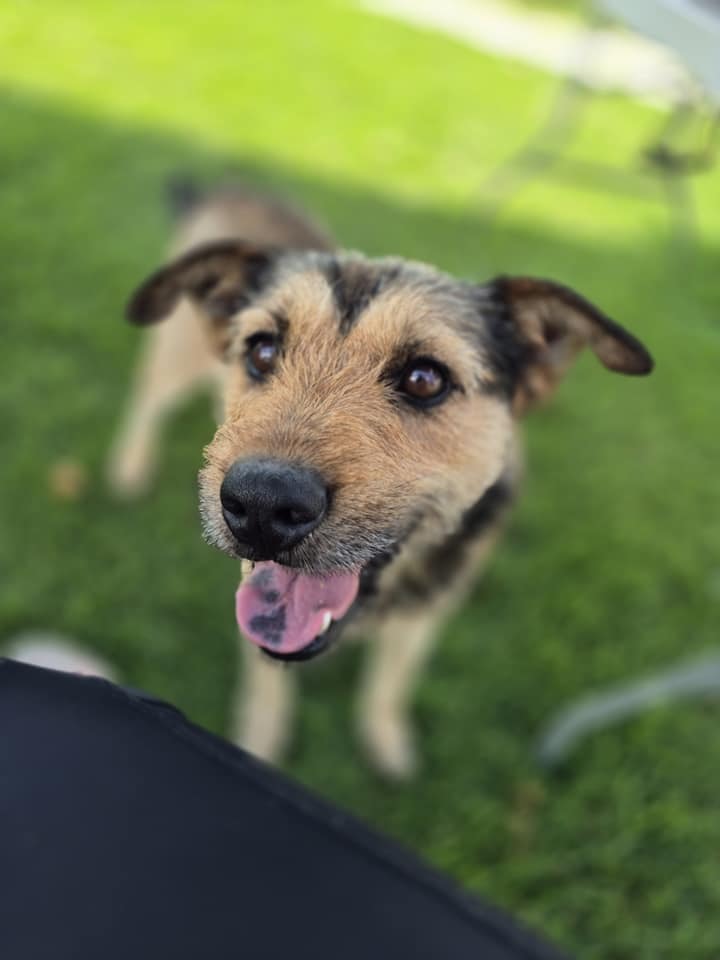
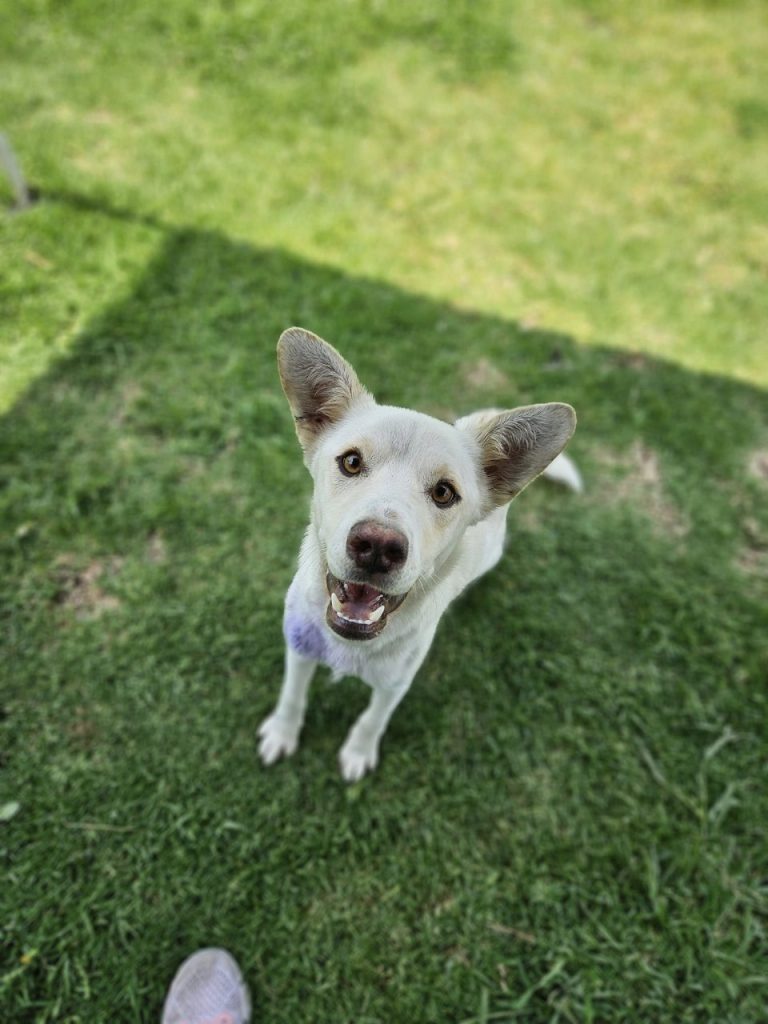

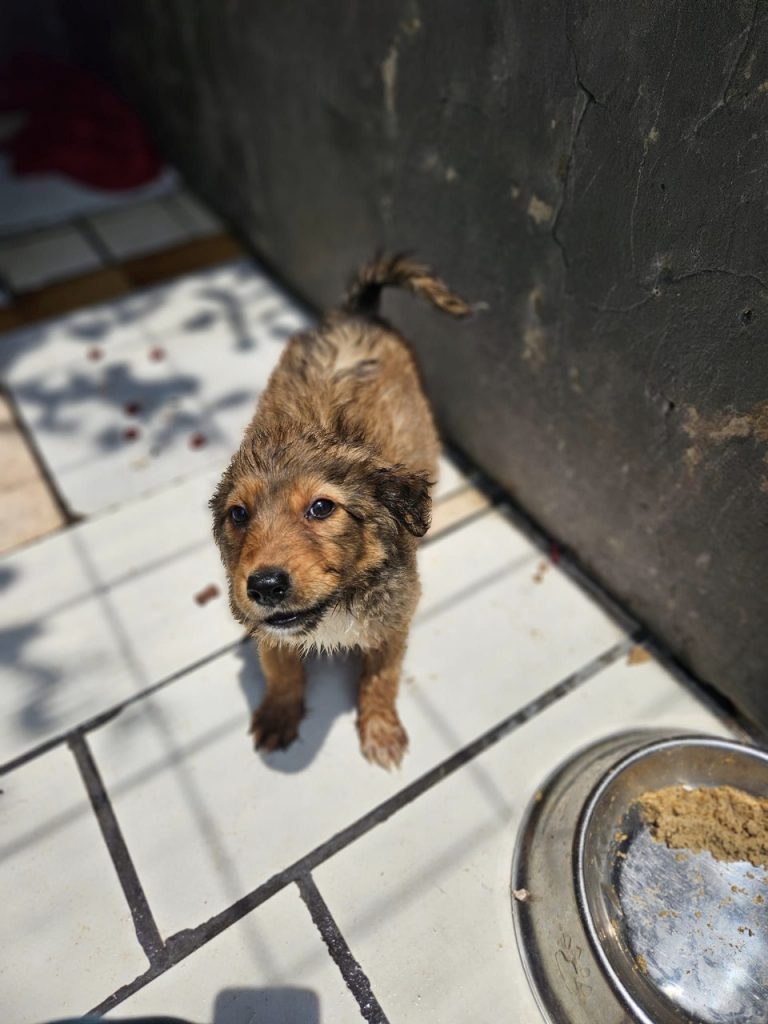
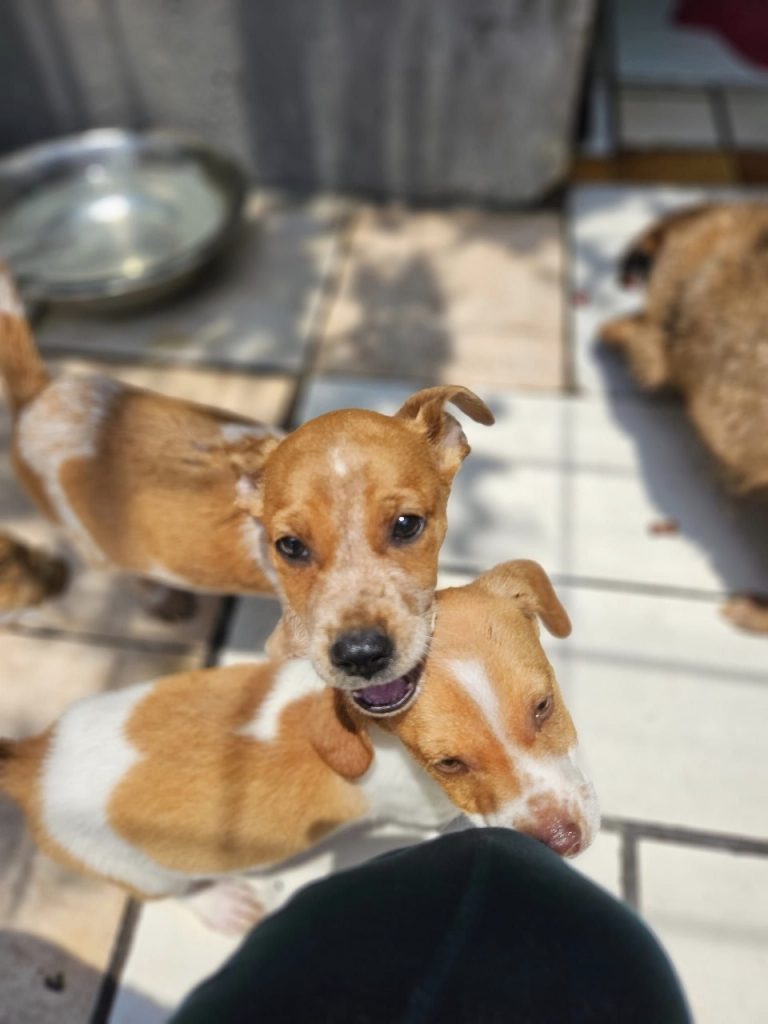
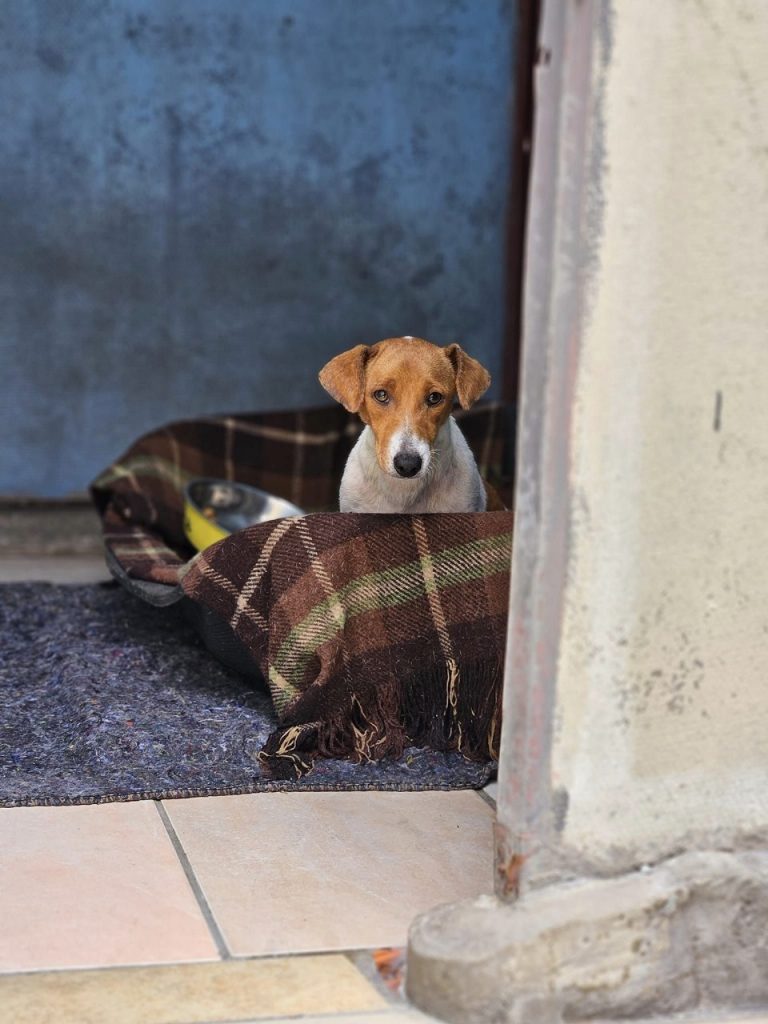
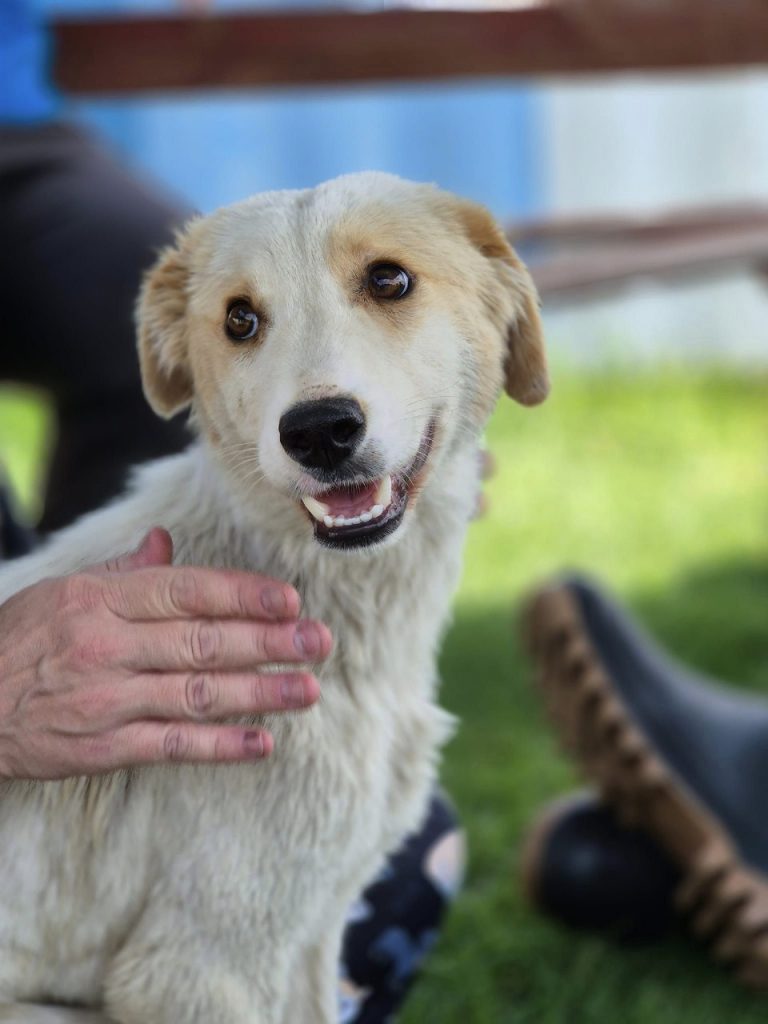
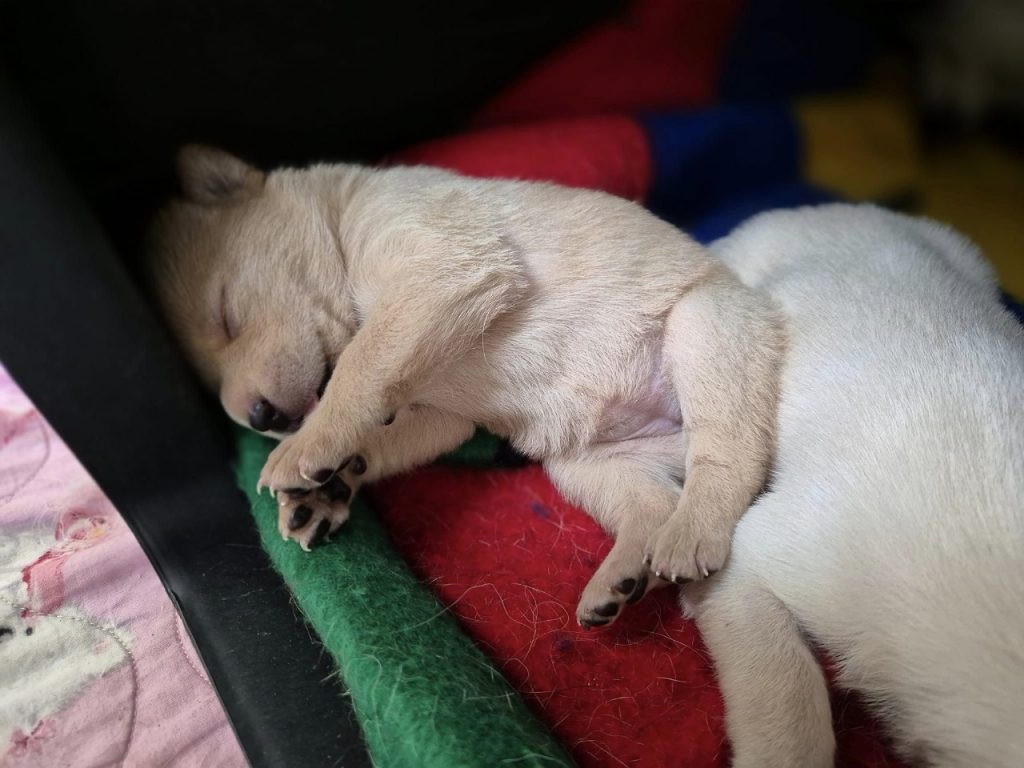
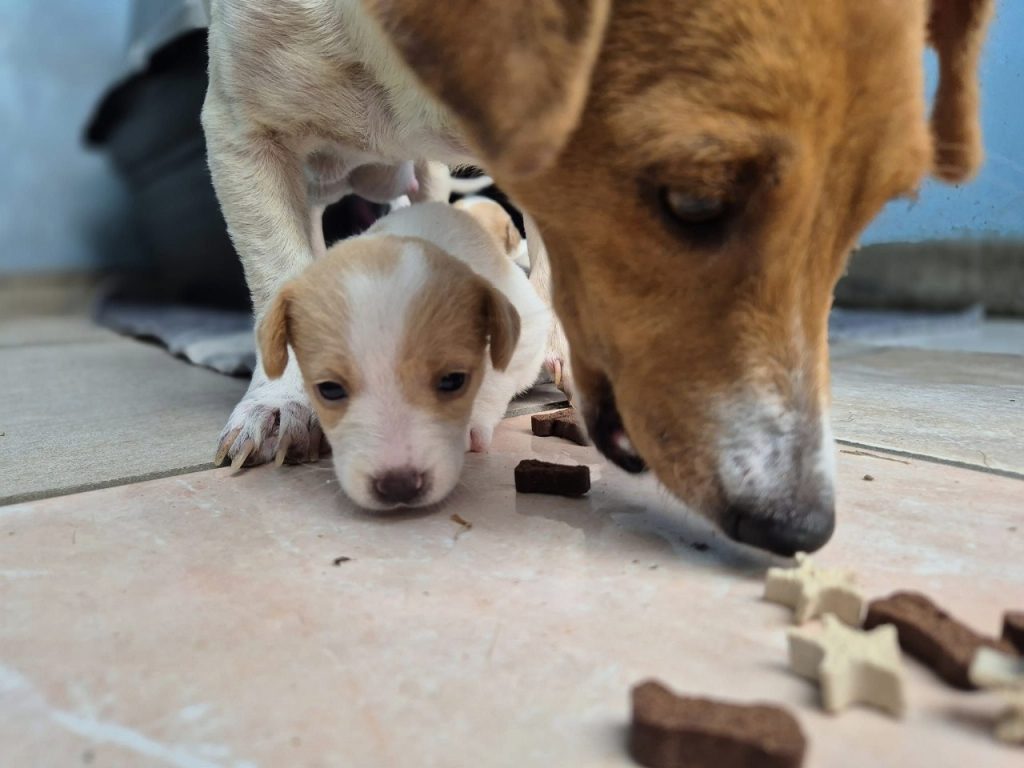
We must pause here for a moment and point out that the HRSPCA is doing a tremendous job of the task at hand. It is a young vibrant team, and I would not like to stand in their shoes. Please send them a note of encouragement. The trauma that they had to go through regarding the killing of the animals is indescribable.
I find the NSPCA and our SPCA light years apart. I say our because it is from our community, and they serve our community. The current committee of the HRSPCA have managed to turn the SPCA around into a society that we as a community can believe in and support. Gone are the negativity of the previous committees.
The Bulletin once had a query and the chairman (HRSPCA) came with full disclosure, unlike previous committees. What a turnaround! A fresh relationship could now be built that makes The Bulletin proud to be associated with this committee.
I see the efforts that they are making to find homes for the animals, most of which are surrendered. For those who struggle with the term, it means that they are given away and no longer loved.
“No longer loved”! I wonder if we think about it. “No longer loved”. Dogs are pack (group) animals and undergo tremendous trauma when taken from their home and stuffed into cages. They are confused and scared but most of all they are longing for that little love that they know. Even if it is just a little.
But I digress, please visit their page at https://web.facebook.com/HighveldRidgeSPCA and give your support. They need it.
I will include some of the documentation the NSPCA has written on to show their reasons for euthanasia.
But first, we need to look at the rest of the day’s incidents, but I will keep it short.
A representative of the landowner arrived at the HRSPCA as well as a concerned member of the public. Both were treated with extreme hostility and arrogance by one member in particular stating “What are you going to do” most of the time.
The group behaved as untouchables. The police were called to have the Bulletin removed from land that they had no authority over. Fortunately, the police assessed the situation and did not try to remove me from the land.
The main reason for the request to have me removed is that I, as The Bulletin am hindering them from doing their duty. This is while I was sitting in the HRSPCA shop, and they were busy in the VET room. When I left the fenced area (I was threatened that they would lock me in) I parked on the side of the HRSPCA area. The Female inspector and the one who assaulted me claimed that they felt threatened by my presence.
I wonder what I was not allowed to see. What were they trying to hide?
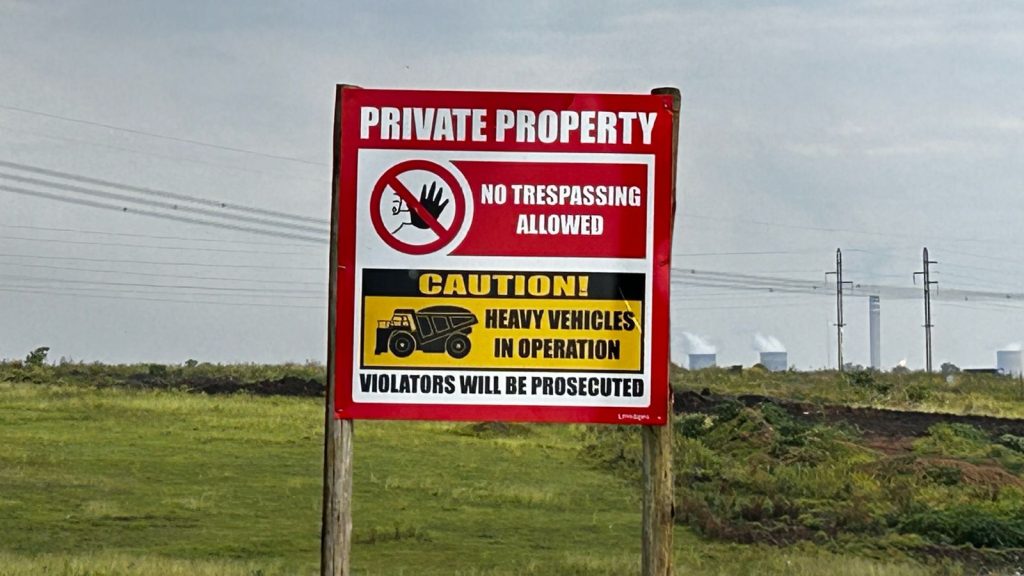
Eviction
The NSPCA and by association, The HRSPCA, has now been given 30 days to vacate the premises. I would expect that the HRSPCA would cease to exist at that time but that a new vibrant NPO might arise.
The letter to the NSPCA, that I was able to see, reads: We confirm that a 30-day notice to vacate the premises is hereby served on you. We hereby confirm that there is no lease agreement and no rent is paid.
The letter further makes it clear that no member of the National Council of SPCAs is allowed on the premises without written authorisation. Any such violation will be considered as trespassing and will be charged with a criminal charge of trespassing.
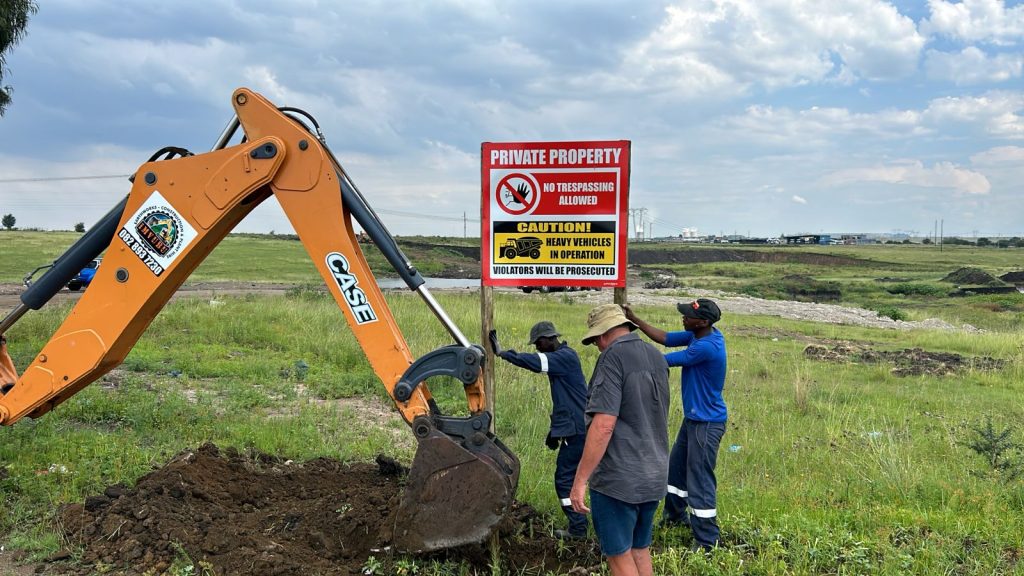
The VET room
During my visit to the VET room, I was physically prohibited from seeing anything inside. This is the room where the animals met their demise.
I managed to visit them afterwards and was appalled by the state that the NSPCA had left it in. There were faeces on a blanket.
There was blood on the side of the fridge.
There was hair from the animals left on the table.
Bloody needles and syringes were also left for the HRSPCA to clean up.
It is a stark reminder of the carnage that took place.
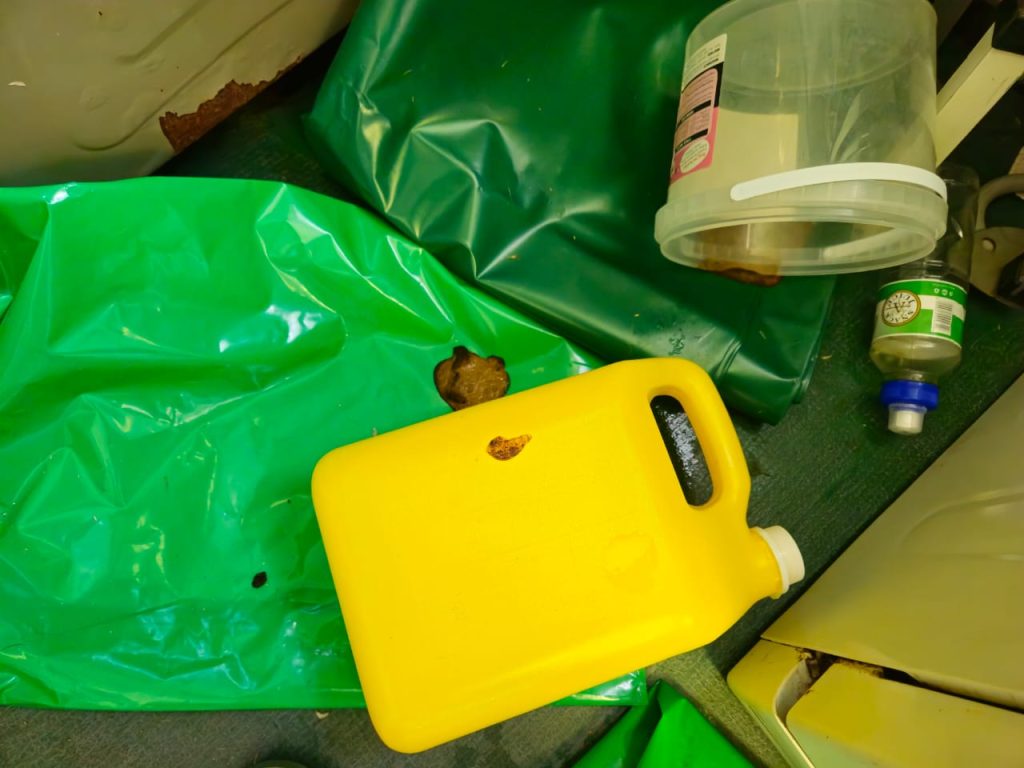
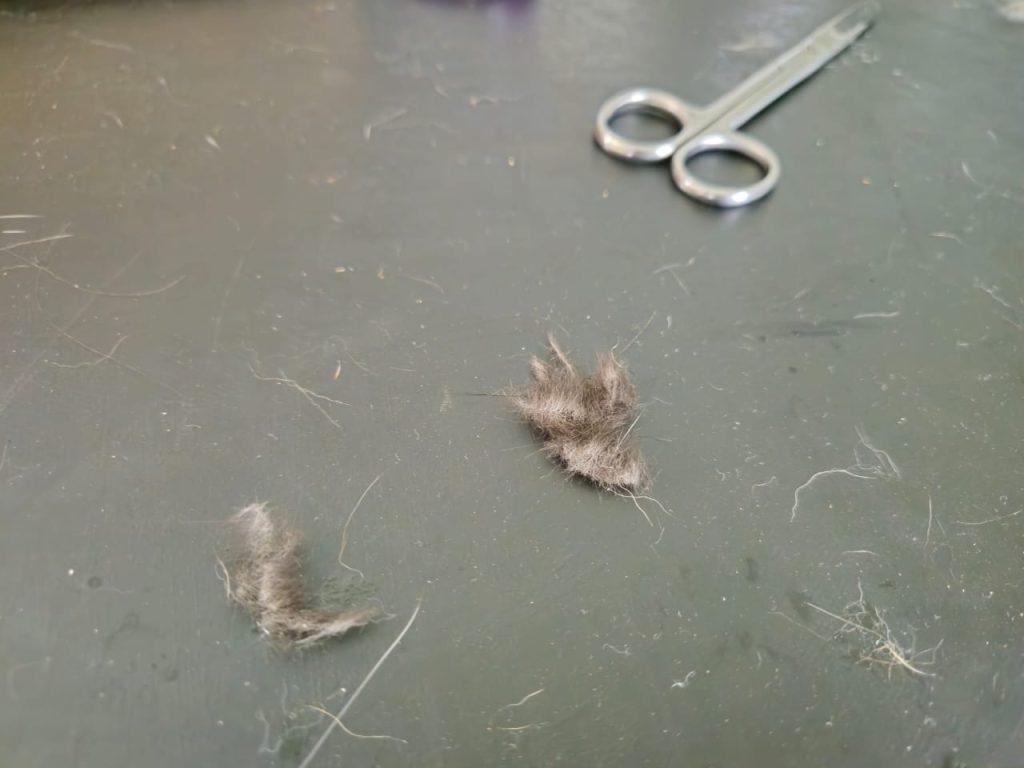
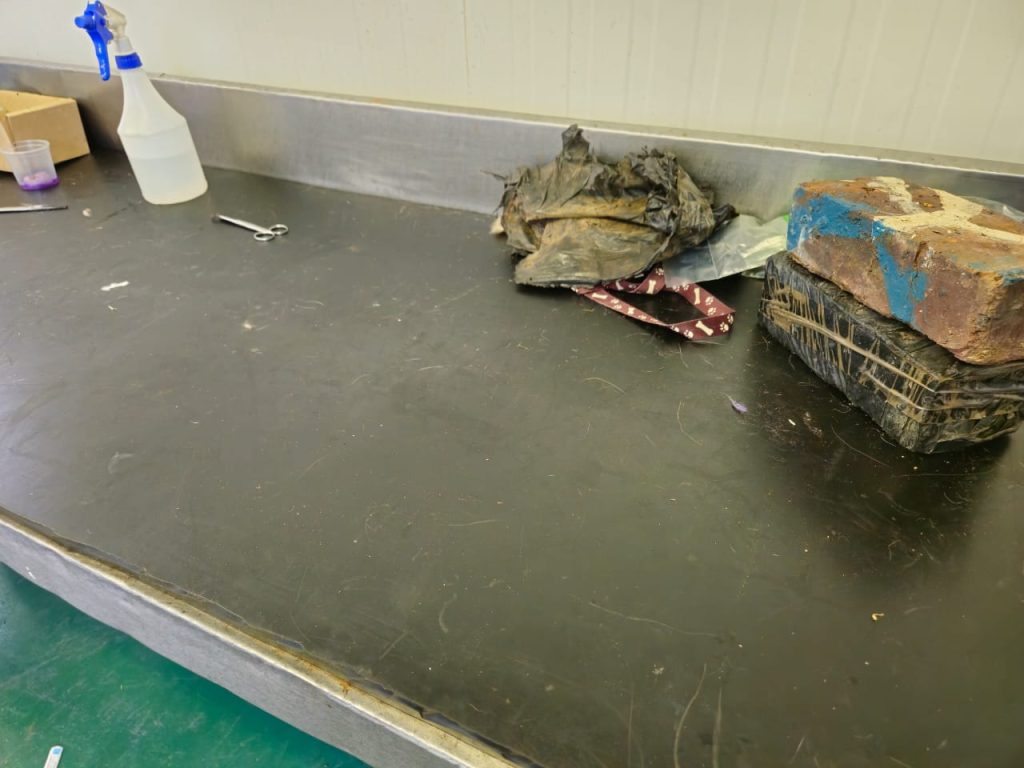
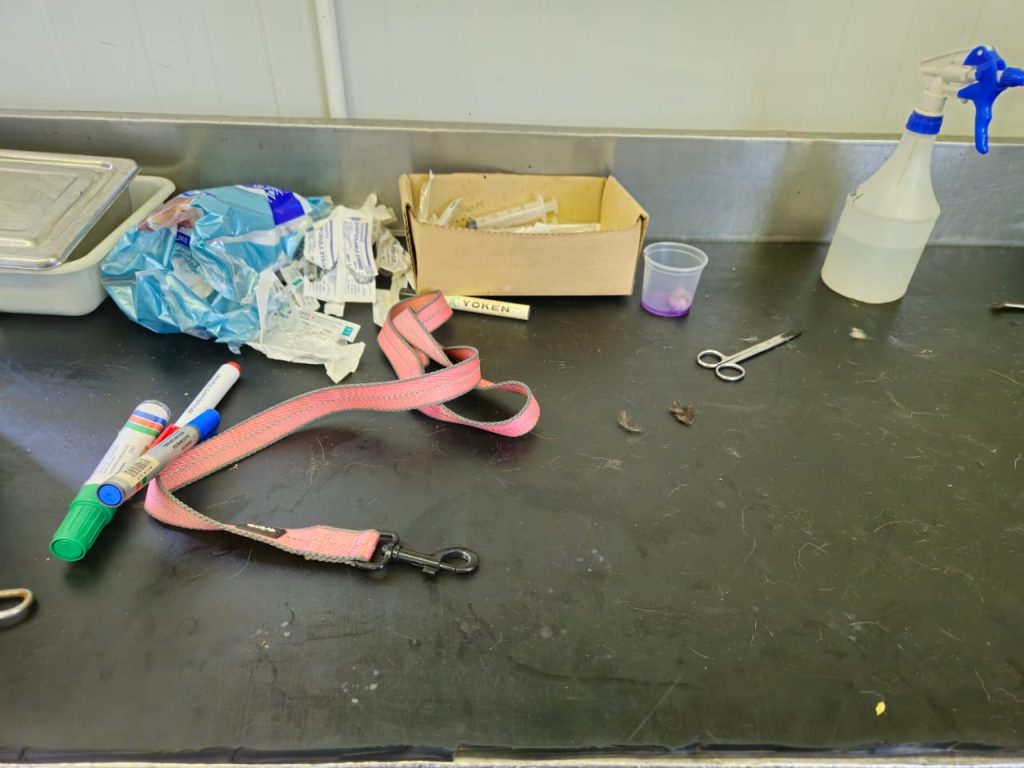
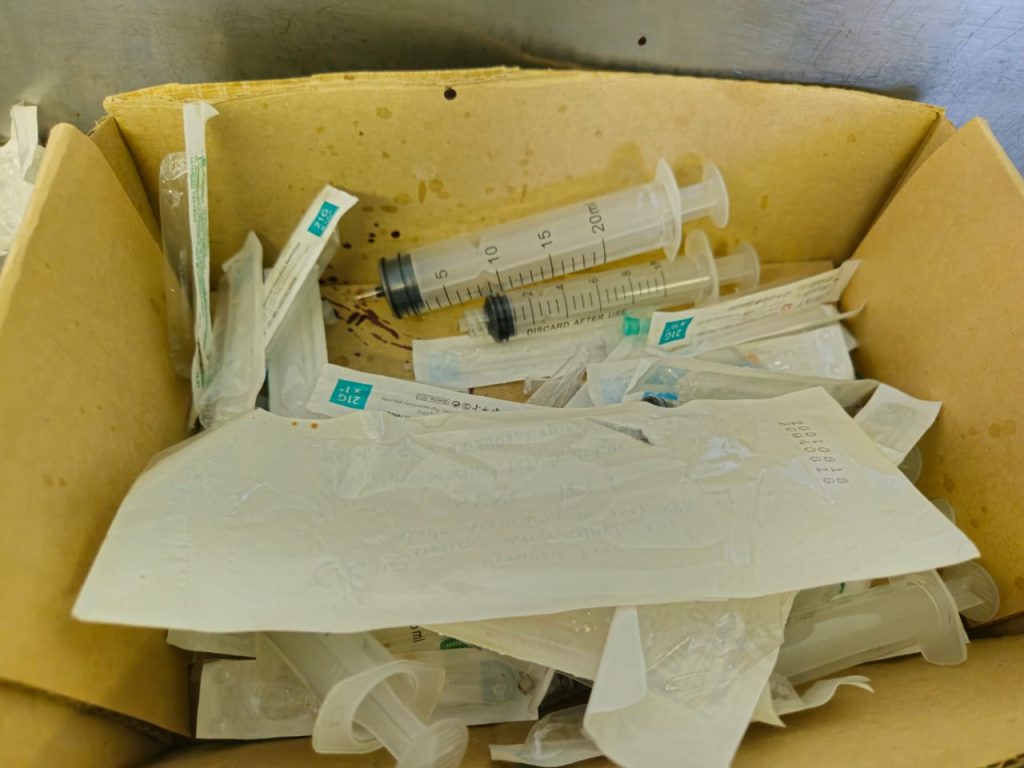
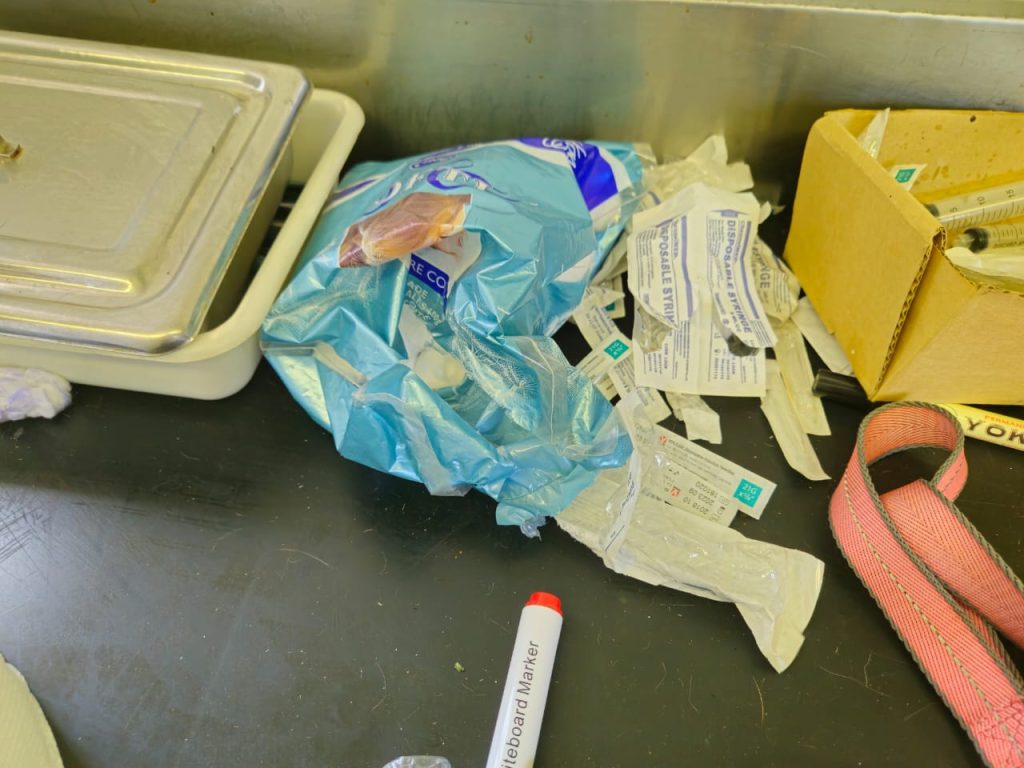
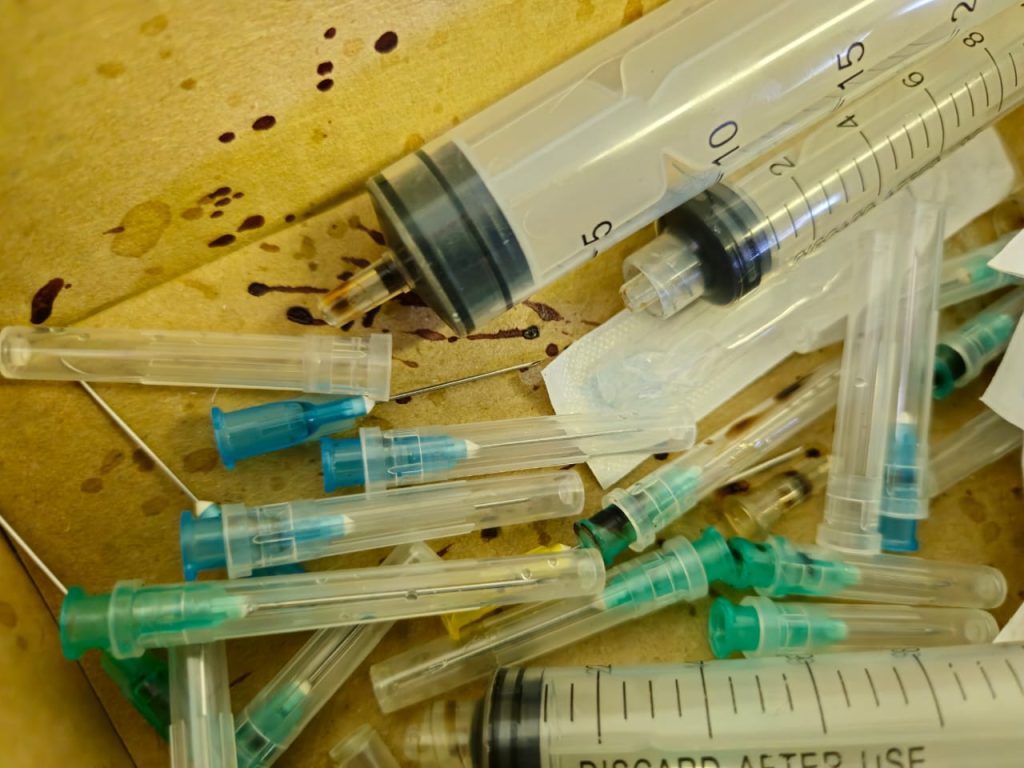
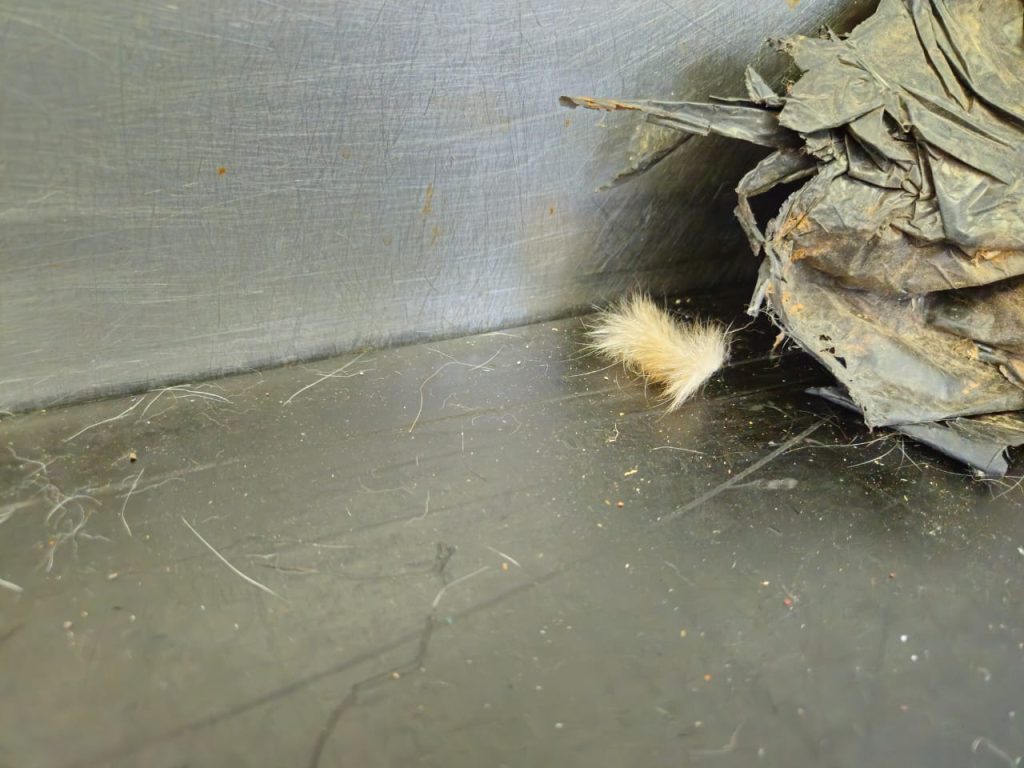
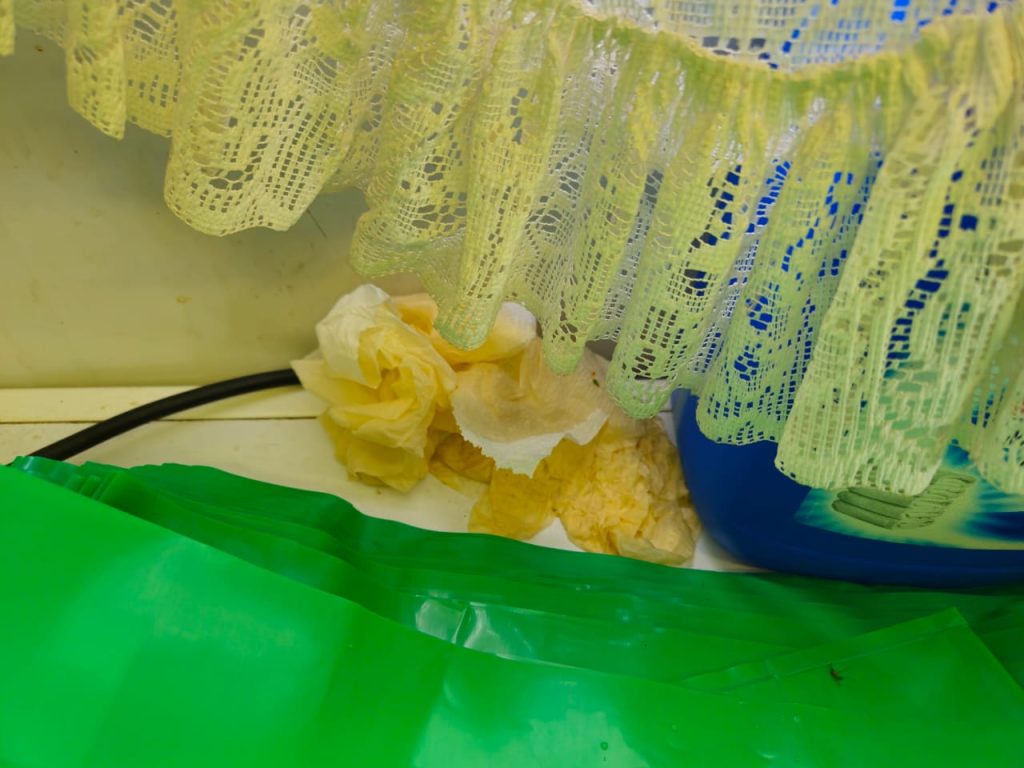
Some of the animals arrived on the same day that they were euthanised. The Bulletin has proof of this. Two Boer bull puppies were surrendered and were put to sleep on the same day. Another animal was surrendered and carried to the VET room straight away.
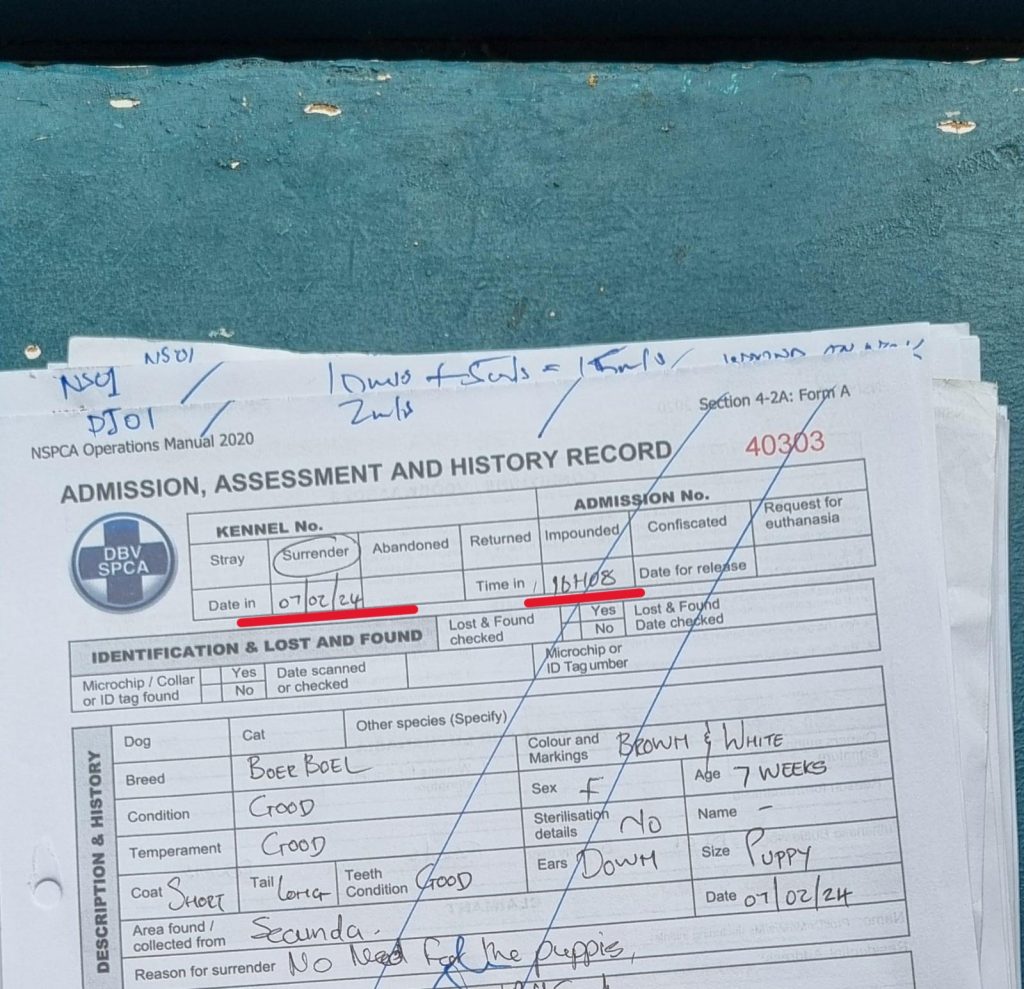
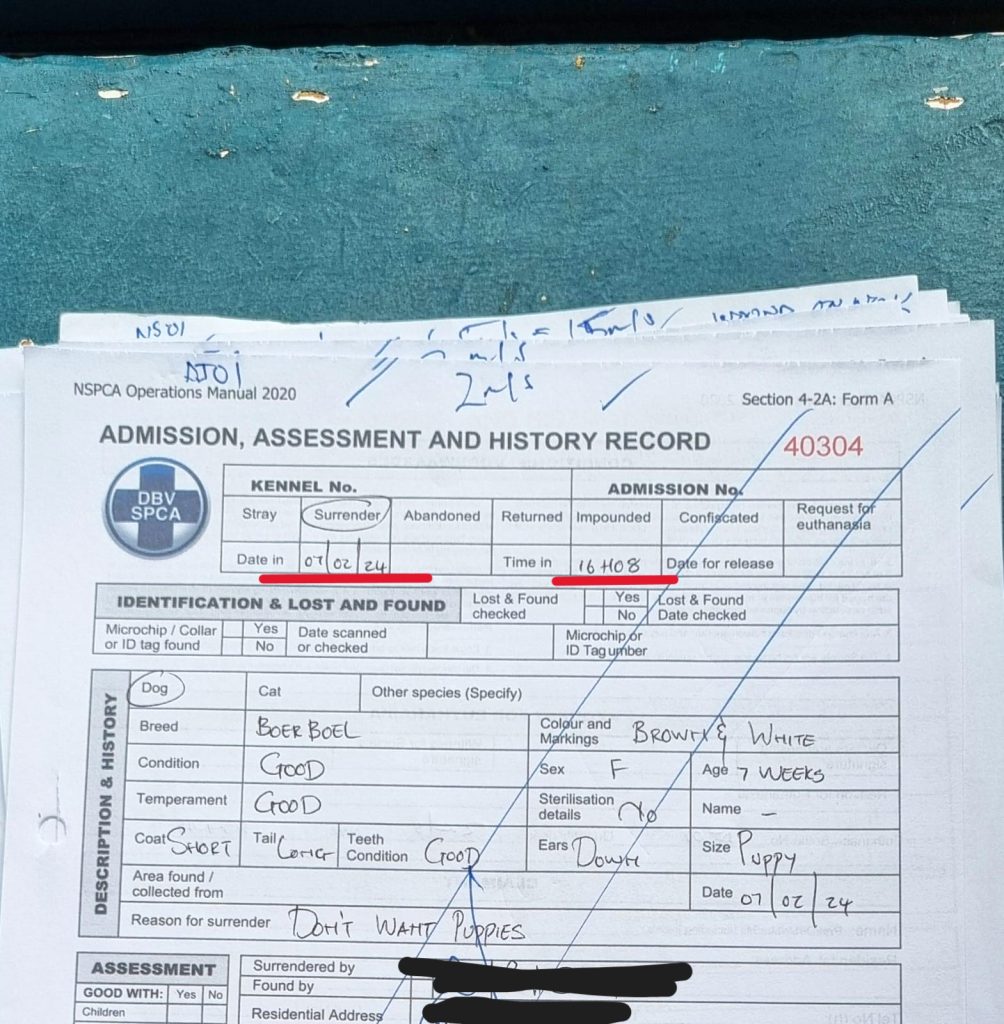
The community rallied behind the current committee of the HRSPCA and they continued to flourish only to be bullied by the big guns, the NSPCA.
I will include correspondence from my previous enquiries into the death of 114 animals for all to see. It will also afford you, as our valued reader, an opportunity to come to your “own” conclusion as to the transparency and methodology of the NSPCA. I did not ask for any responses to the latest incident as I deemed it fruitless due to several issues. Mainly because there would be animosity and bias after our confrontations at HRSPCA. Secondly, I never received a response that was truthful and transparent in my opinion.
I would allow the NSPCA a “Right of response” if they so chose.
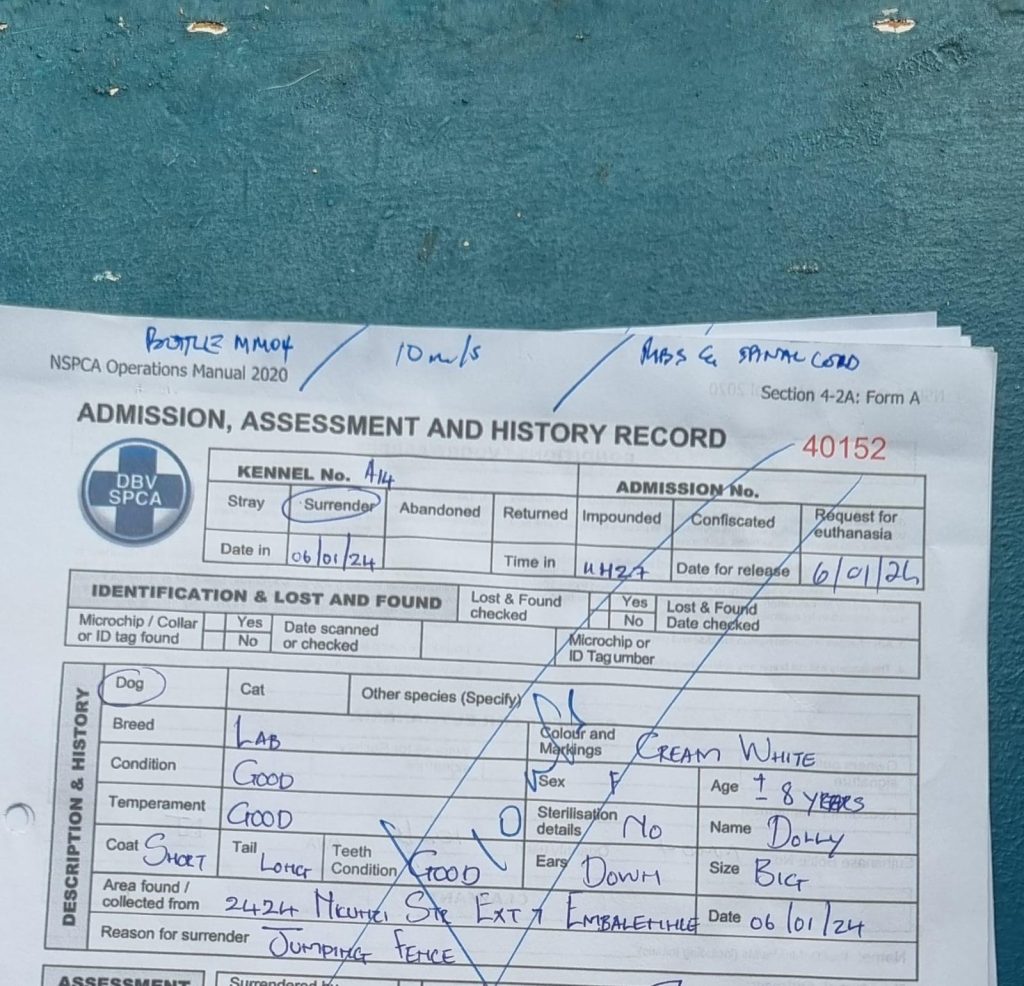
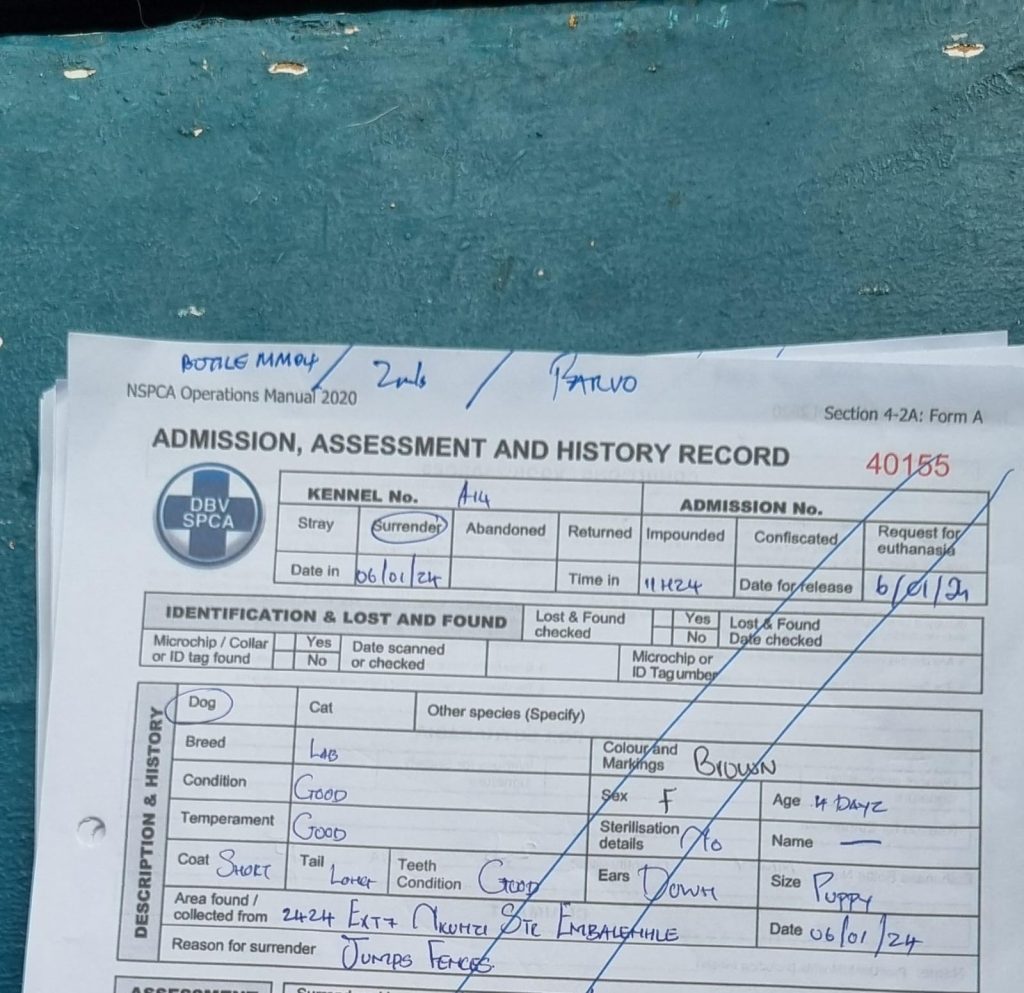
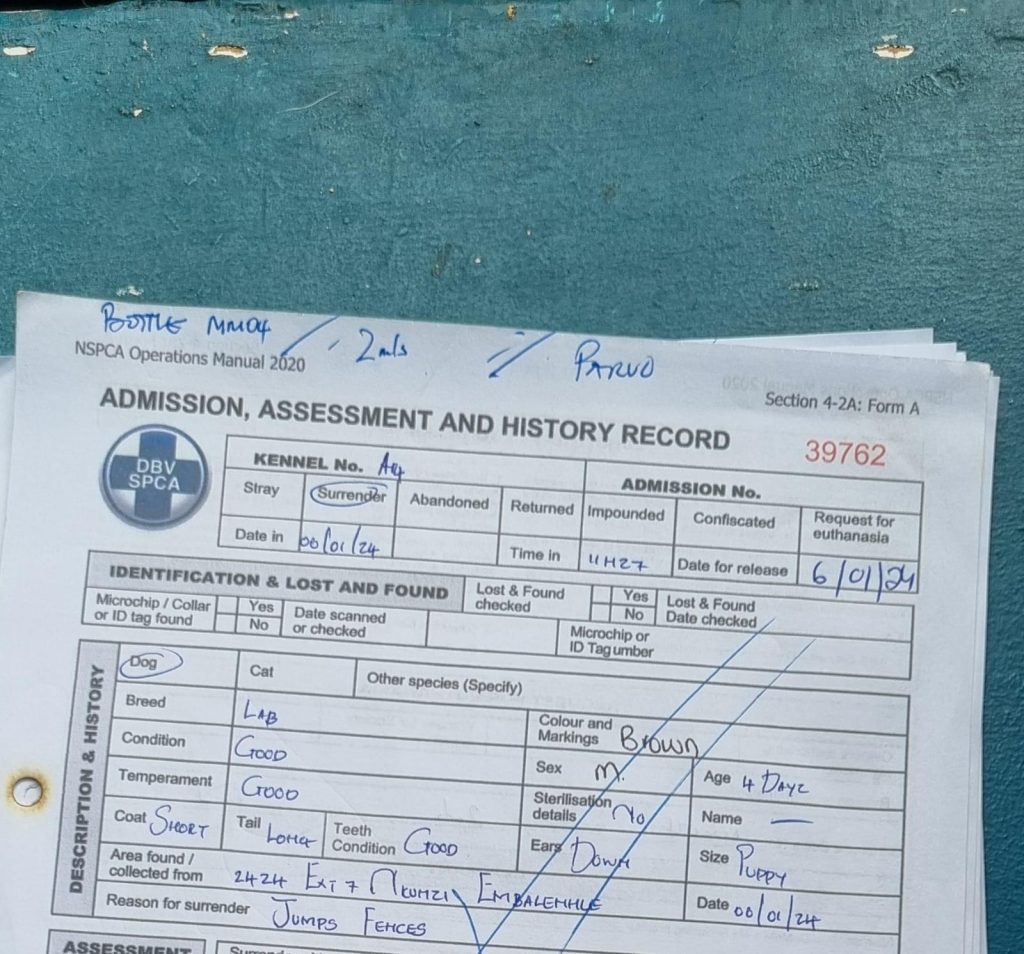
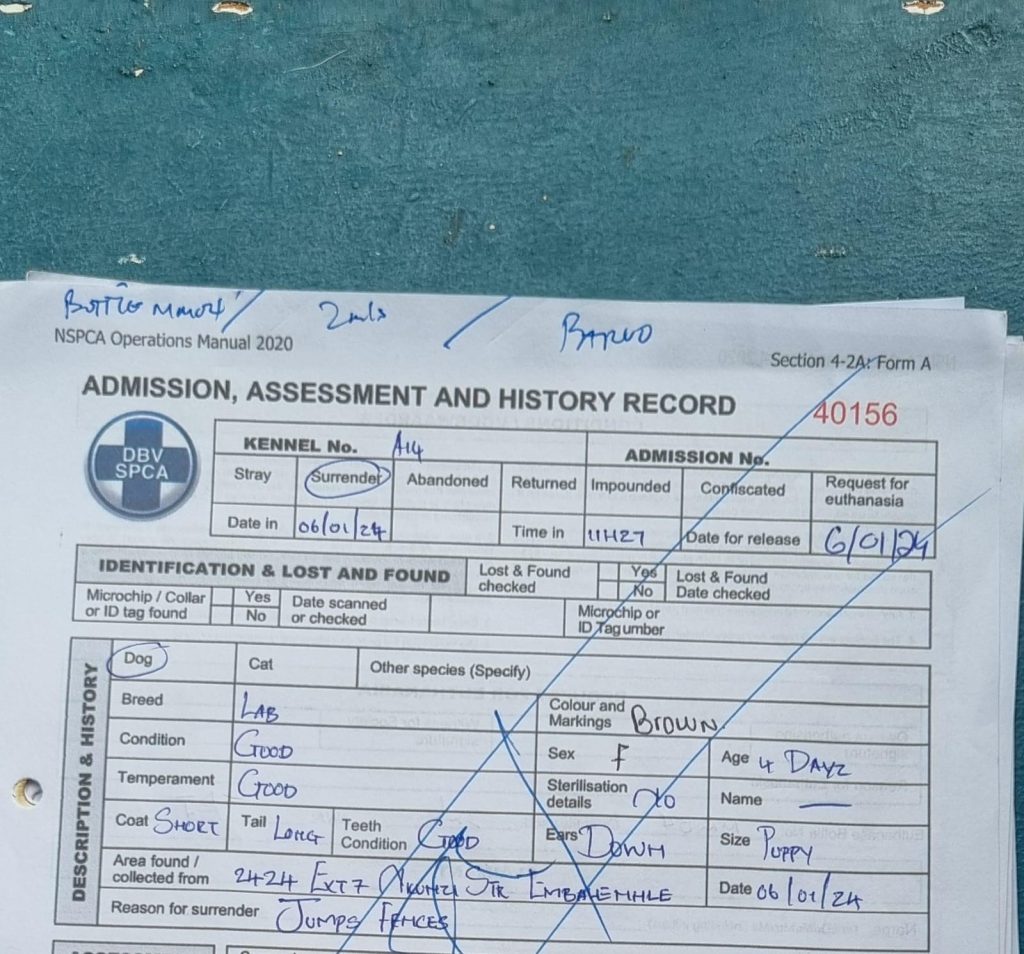
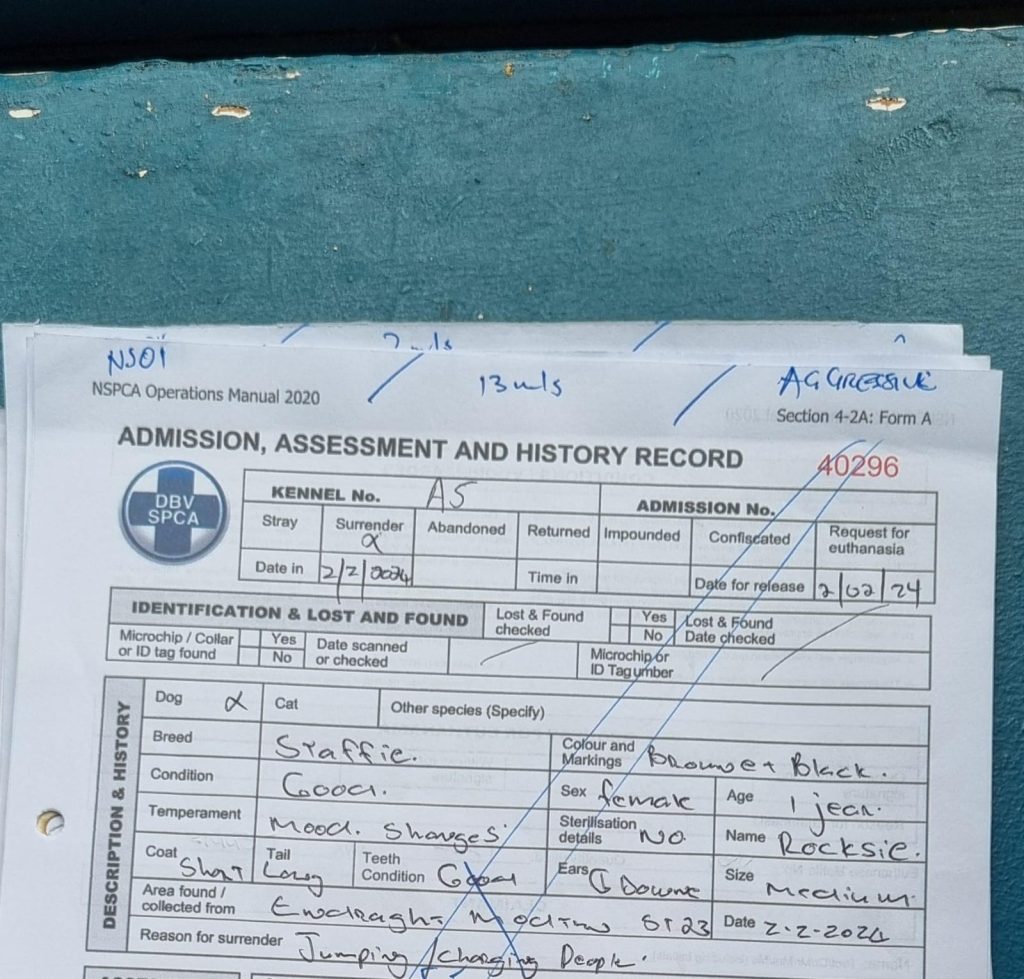
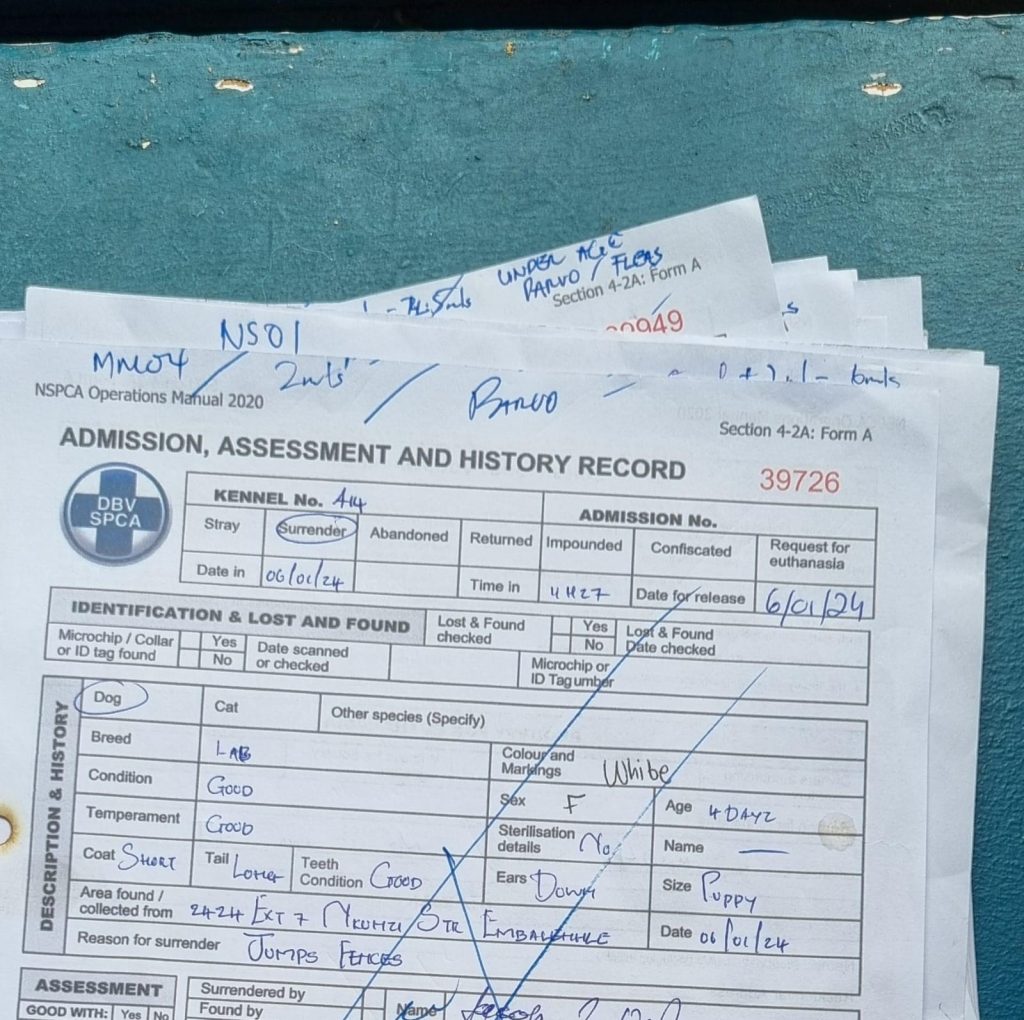
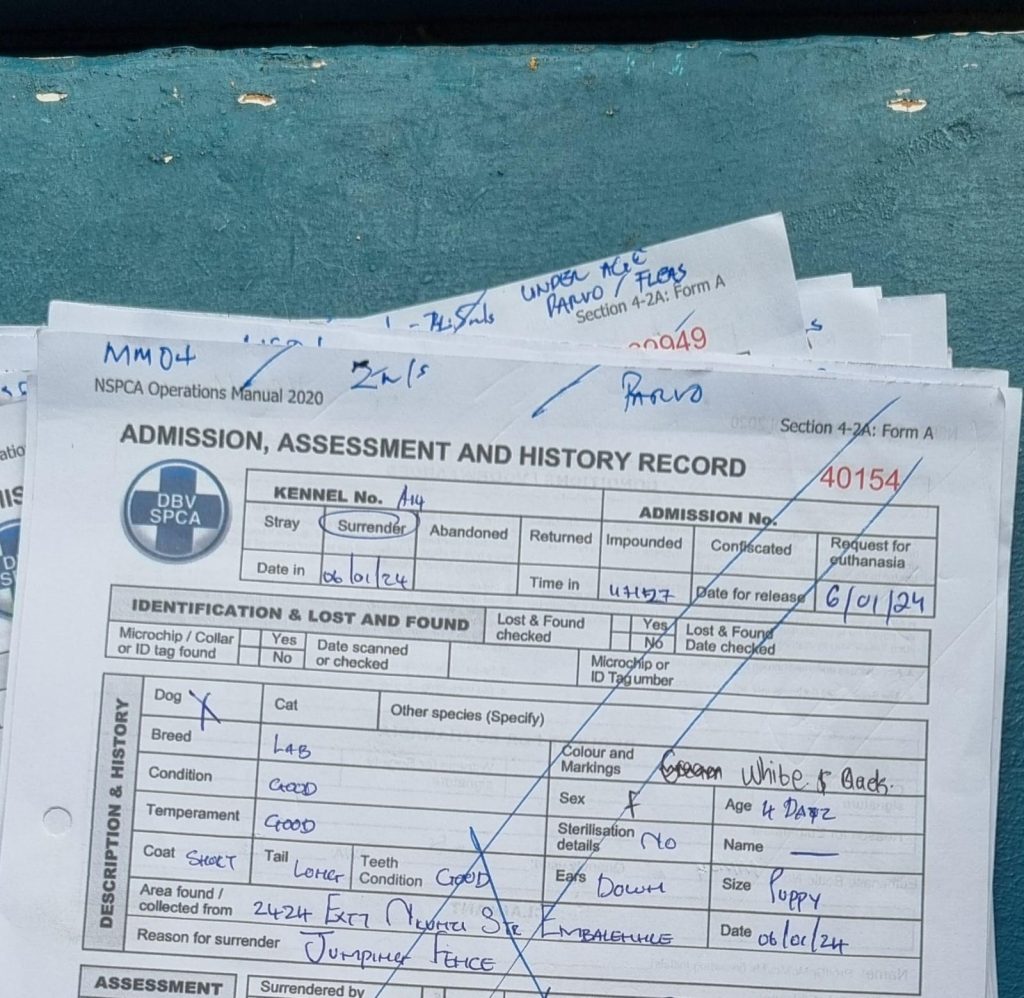
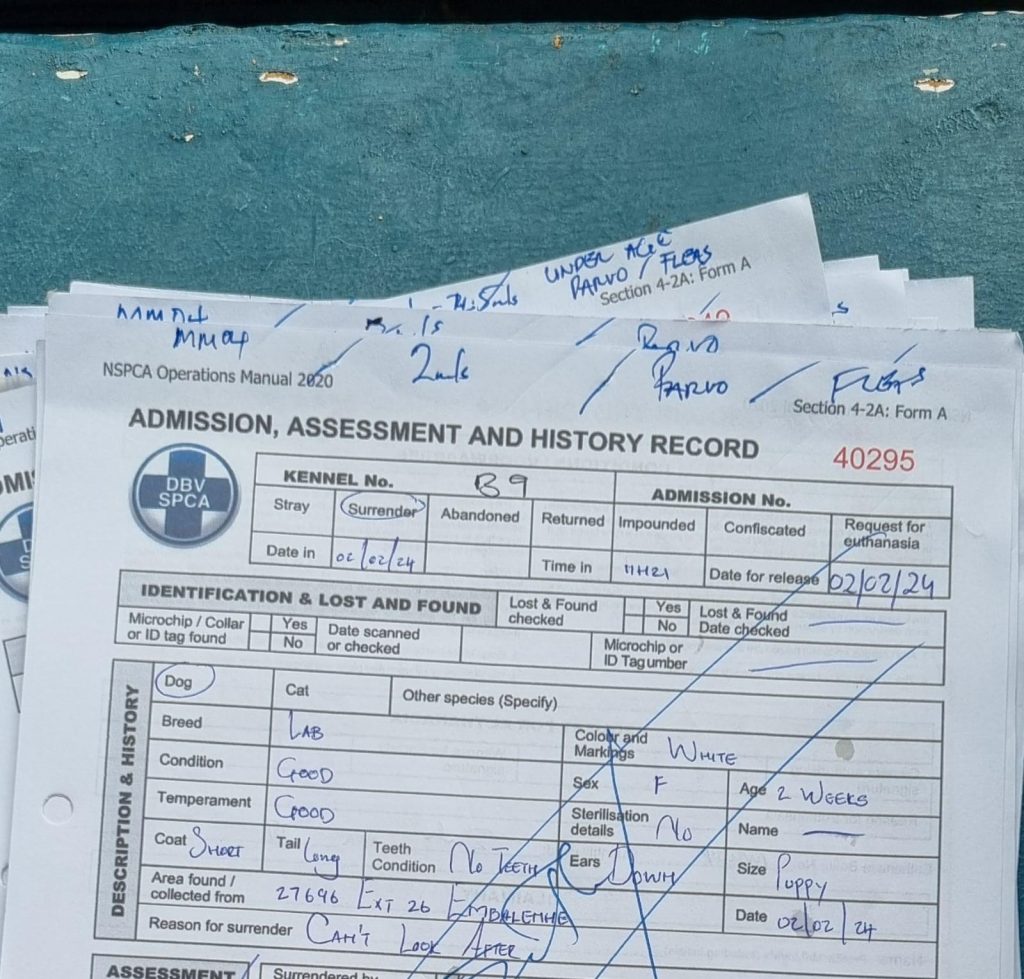
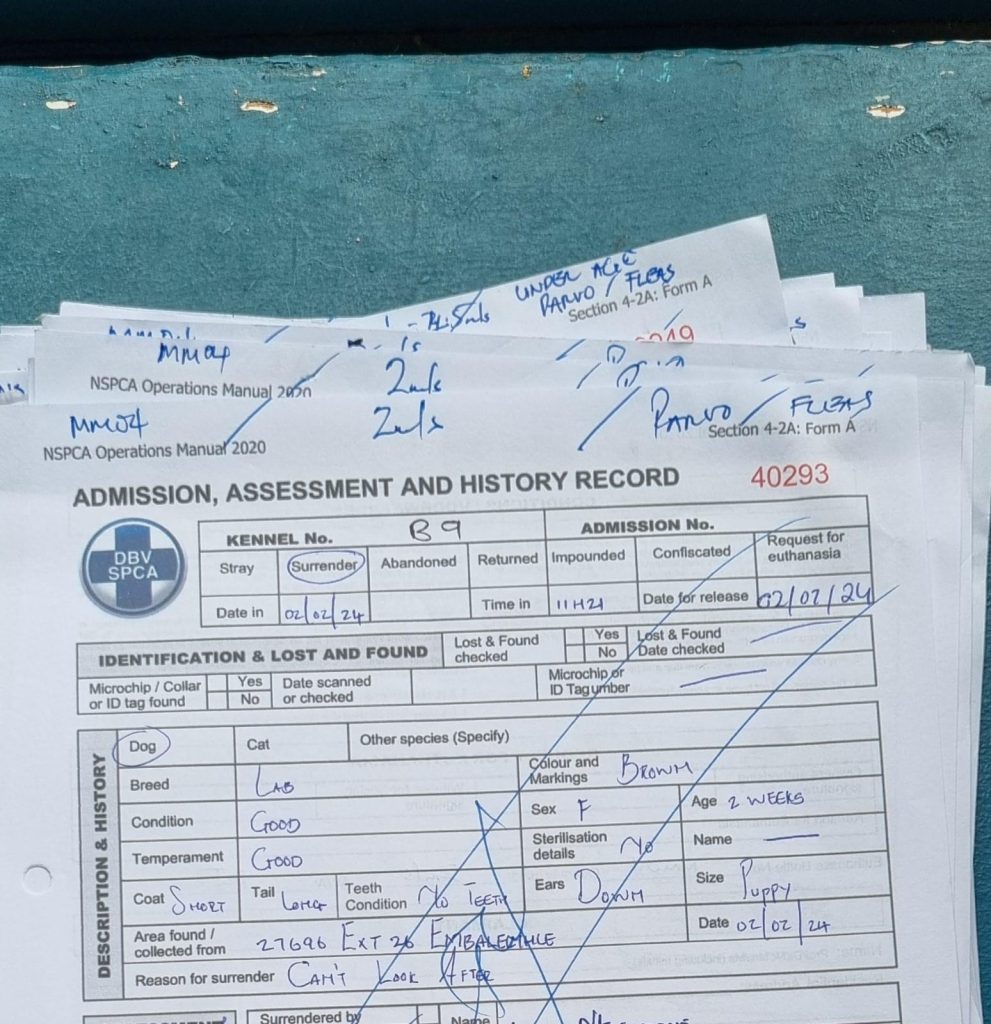
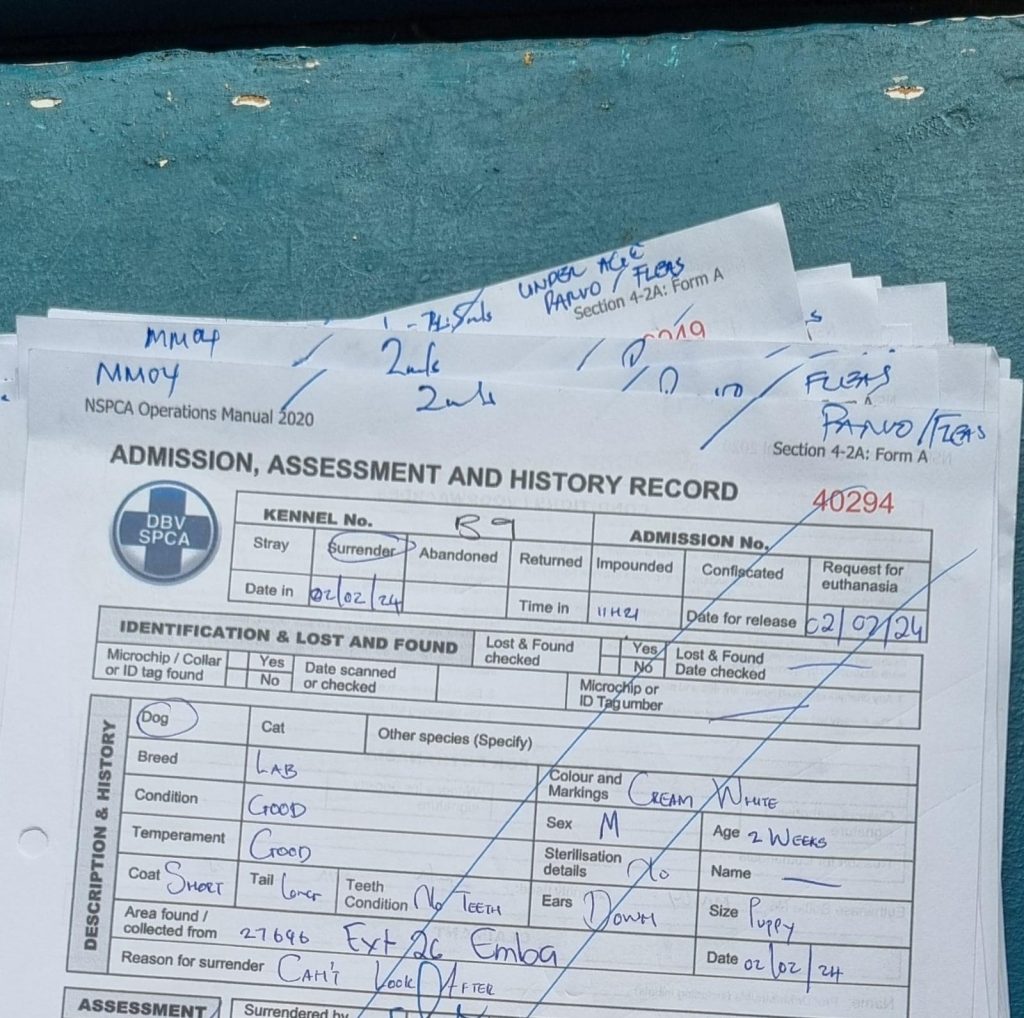
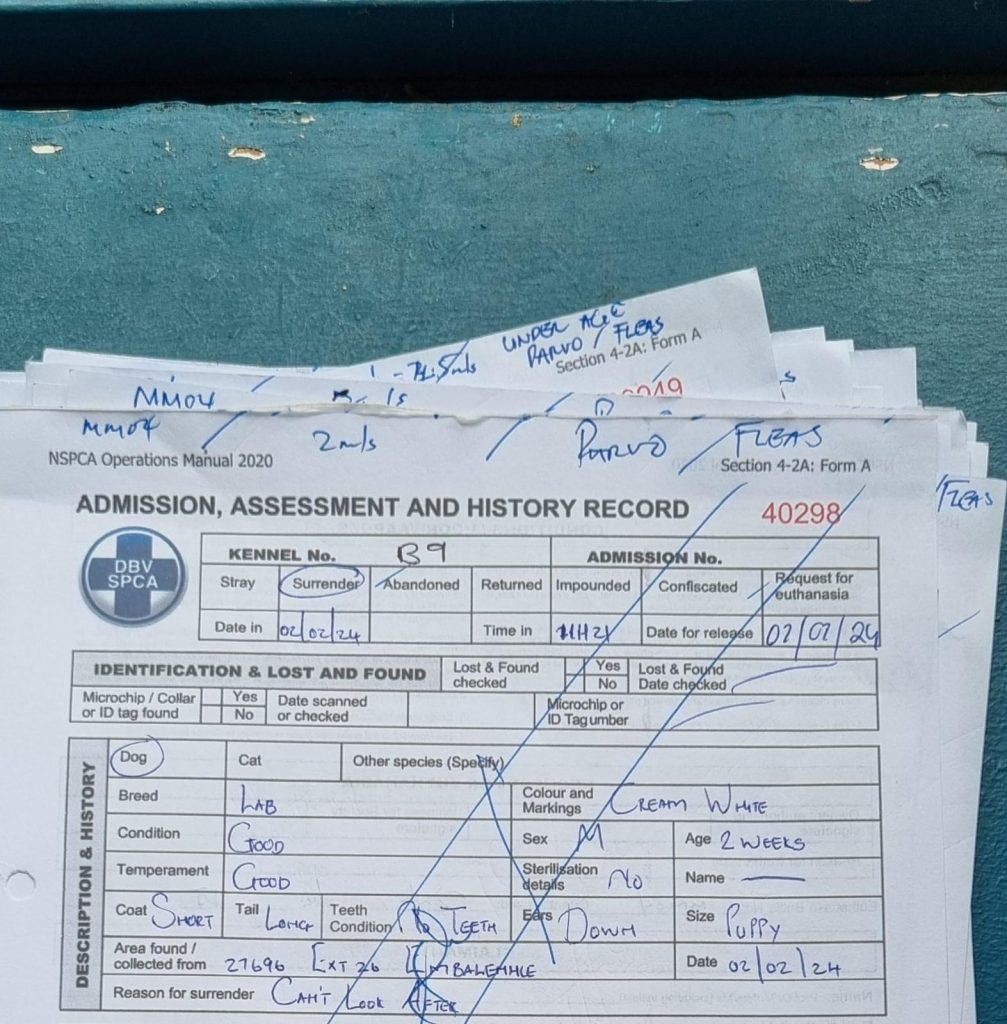
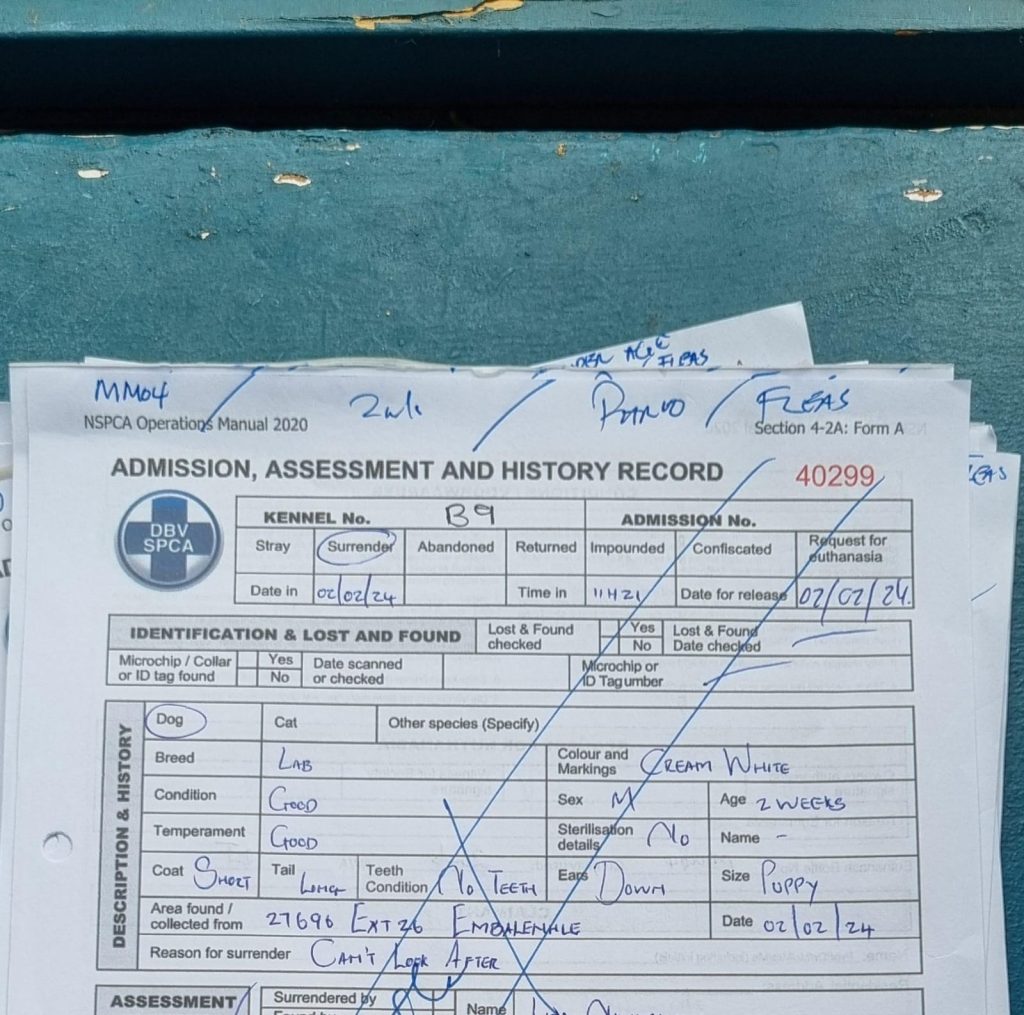
Possible Parvo outbreak
If one examine the reasons for most of the euthanasia, it becomes clear that there would be a Parvo outbreak within the HRSPCA but the NSPCA has given no instruction to erect notices to warn the public nor did they make any effort to do it themselves.
The American Vetenary Medical Association describes the Parvo virus as follow: (read the full article HERE)
Canine parvovirus infection is a highly contagious disease caused by canine parvovirus type 2 (CPV-2). There are several strains of CPV-2, and all produce similar signs. The disease they cause is commonly called “parvo.”
They further writes that the most important signs to look for would be
- Lethargy
- Loss of appetite
- Vomiting
- Severe, often bloody, diarrhea
- Abdominal pain and bloating
- Fever or low body temperature (hypothermia)
If your dog shows any of these signs, immediately contact your veterinarian. Persistent vomiting and diarrhea can quickly cause dehydration, and damage to the intestines and immune system can cause septic shock. This can lead to death, with most deaths occurring within 48 to 72 hours after signs first appear.
How is canine parvovirus diagnosed and treated?
Your veterinarian may suspect parvovirus infection based on the signs your dog is showing, your dog’s history, and other factors. Fecal testing can confirm the diagnosis.
Dogs with severe infection need immediate, intensive treatment and 24/7 monitoring—which often involves several days of hospitalization. Supportive care is provided to correct dehydration and physiological imbalances caused by vomiting and diarrhea, control nausea and pain, keep the dog warm, prevent other infections from happening, and provide nutritional support. Additional treatment may be recommended to help fight the infection and/or combat diarrhea. This can all be very expensive, and the dog may die despite treatment. Prompt, intensive treatment improves the chance of survival.
Please read the full article.
The Bulletin received enquiries and comments on the latest incidents. All voicing their support for The Bulletin and the HRSPCA committee. All were unhappy with the actions of the NSPCA.
I wrote to Tersia Woest, Manager: Society Liaison Unit, regarding the shocking news of the actions on 30 Nov and 1 Dec 2023.
I have to be honest, I did not expect any response from the NSPCA as previous correspondence and promises were not kept by the Society. I refer to numerous previous incidents where The Bulletin had the misfortune to corespond with the NSPCA
Question: In the past, the NSPCA has shied away from taking responsibility for some actions taken by both the NSPCA and HRSPCA. will this be the case again?
NSPCA answer: The NSPCA is not sure what the context of this question is and cannot comment on “in the past […] shied away from…” The NSPCA has a demonstrated history of being a transparent, ethical organisation. We cannot take the responsibility of local SPCAs, as we enforce the SPCAs Act – that would amount to being both judge and jury. (Emphasys added by the Bulletin)
This is the type of answers that The Bulletin received.
The Bulletin believes that the NSPCA and our SPCA are light years apart. The NSPCA acts as an elevated society while the HRSPCA is trying everything possible to survive whilst still trying to home animals and care for them.
I do not believe that the NSPCA did the “right thing” and I might be wrong. I also cannot speak with the HRSPCA Committee members as the NSPCA with surely censure them as they follow very strict rules and a “code of conduct”.
Bulletin believes that everything possible should have been done to home the animals rather than euthanasia as a solution. This is also most of the responses that we received when speaking to the public.
It is a shame that only certain cases matter for the NSPCA and others do not, such as the killing of horses etc. 177 animals surely did not matter but rather sheep that are exported or fish that is kept in a tank at a restaurant in the Kruger National Park! (This brings to question the thousands of fish tanks in homes across South Africa.) Read the NSPCA article on the fish HERE:
We have to applaud the efforts of people who took it to heart that live sheep should not be exported, especially in the conditions they were transported in. Well done for this! But sadly 177 animals will not experience the same effort that the NSPCA gave these sheep. Not even the same effort that the NSPCA gave the fish in a tank!
In the words of Marcelle Meredith, Executive Director, NSPCA in her recent Seasons Greetings: ”Together, we will continue to advocate for animals, ensuring that their voices are heard and their welfare is protected and we will not give up.,”
Why do we not have a story on the webpage of the NSPCA that says: 177 animals saved!
Is it better to do “The Right Thing” for the media or for the animals?
Queenstown SPCA
The Queenstown SPCA also experienced the wrath of the NSPCA.

The committee has been replaced with an interim committee.
In a statement on the NSPCA website, Click HERE to read the full statement, accusations were made as follows:
The concerns of the NSPCA include the homing of unsterilised animals and without pre-home inspections being conducted; financial mismanagement such as funds being deposited into a non-SPCA bank account operated by committee members, and the committee carrying petty cash in excess of R24,000.00; as well as a failure to engage with the Municipality successfully regarding the expiration of the lease.
The former committee of Queenstown wrote this as a response to the non-SPCA bank account, the full statement can be read HERE:
Funds being deposited into a non-SPCA bank account operated by committee members.
– A committee member took the initiative of selling food socks and making birdbaths, in her private capacity, to raise much needed funds for the Queenstown SPCA. The SPCA logo was not used in advertising these items and they were only advertised on her private Facebook page.
– The member paid for the costs of starting both these projects, using her own personal funds. She opened a private bank account, in her name, solely for the purposes of keeping record of the projects.
– The money from sales was deposited into this dedicated account, for her own recon purposes, as the profit eventually generated from the projects would be donated to the SPCA, as a private donation.
– If the above is what NSPCA is referring to, the funds deposited into the bank account were not SPCA funds until donated.
The methods of the NSPCA are angering people. Even to the extent that some have complained about the non-rotation of the chairperson.
Here is the full response from Tersia Woest, Manager: Society Liaison Unit regarding the incidents on 30 November and 1 December 2024. Her responses are in Italic.
Good afternoon Tersia
Thank you for your phone call on Monday Morning.
The tele conversation as well as the incidents at the Highveld Ridge SPCA on Thursday and Friday last week has reference. (30 November and 1 December)
During this time 106 animals were euthanized.
Please co you give clarity on this matter?
Please note that the figure above is incorrect. Kindly check your source.
The SPCA is opposed to the euthanasia of fit and healthy animals but accepts the reality that euthanasia is necessary.
The SPCA lives for the day when healthy animals are no longer euthanased owing to the lack of suitable homes. However, as a result of the current overpopulation of domestic animals caused by indiscriminate breeding, the dumping of unwanted animals, irresponsible guardianship of companion animals, lack of sterilisation and inadequate enforcement of legislation, the SPCA accepts with great reluctance that euthanasia is necessary.
While ‘slow-kill’ shelters are afforded the ‘opportunity’ to turn animals away once their kennels are at full capacity, the SPCA does not. The SPCA accepts ALL unwanted, sick, stray, and/or injured animals 24/7- because if those animals are not admitted, and are turned away, they face fates that are far worse than a humane death.
However, simply because euthanasia is undertaken by SPCAs, it does not mean that the NSPCA and our Societies do not advocate for finding good homes for animals, and going to great lengths at it too. However, there are not enough suitable homes, as is apparent from the Highveld Ridge SPCA.
When does it become cruel to confine animals to a kennel for a prolonged period of time, causing kennel stress, stereotypical behaviour, bar biting, etc.
I would like to have answers to the following questions:
HRSPCA were very busy with an active campaign to try and home some animals, they were also busy with food donations from the public. How do you respond to the public that has donated just before the euthanization?
There are insufficient space to keep the animals and keeping 3 to 4 large animals in one small kennel is unacceptable as it leads to the outbreak and spread of disease and is a great threat to bio-security.
The Highveld Ridge SPCA cannot run on food donations only. Apart from the food, the increase in animals in the kennels has a ripple effect on the expenses associated with running an SPCA. There are increased costs for water, cleaning detergents and materials, extra staff members to look after the animals, et cetera This will be required to sustain the excessive number of animals coming into the kennels of the SPCA for extended periods of time. To date the Highveld Ridge SPCA has battled on an ongoing basis to keep afloat due to the lack of funds and it is unlikely to drastically change in the near future.
What moved the NSPCA to take such a drastic step?
The NSPCA, as Statutory Body, conducted a routine inspection to ensure compliance with the Societies for the Prevention of Cruelty to Animals Act 169 of 1993 and the Rules made pursuant thereto. Note that this is national legislation.
The Highveld Ridge SPCA simply do not have the capacity to look after the number of animals that were left in the kennels. With one kennel housing 3 to 4 animals, the kennels become dirty very quickly and keeping the kennels clean becomes challenging. In terms of the Animals Protection Act 71 of 1962, animals cannot be kept in dirty or parasitic conditions. This leads to the outbreak and spread of disease and animals will suffer as a result thereof.
In addition hereto the Highveld Ridge SPCA were full to capacity and would soon have to either turn animals away or hoard even more animals.
HRSPCA has been the centre of controversy in several incidents over the past years. How do you think this incident will impact on the public’s perception of HRSPCA and the NSPCA?
It is impossible to predict the future or impact of the public perception, but luckily that is not where our mandate lies. Our mandate lies in the prevention of animal cruelty, which includes being able to sustain the animals kept under our care and to ensure that they are not subjected to suffering in any shape or form.
The community should be mindful that the SPCA enforces the Animals Protection Act as primary focus. Who do they turn to to report animal cruelty? The SPCA. The devastating effects of neighbouring towns like Kriel and Standerton paint a grim picture of the effects of the community ceasing support of their local SPCA.
What will happen to HRSPCA if the public responds negatively to the euthanisation of 106 animals?
We cannot predict the future but our belief in our mandate, namely, the prevention of cruelty to animals, will remain unwavering. We reiterate what we have stated above: when does it become cruel to confirm animals to a kennel for an extended period of time, with no interest from the community to adopt?
What measures will the NSPCA put in place to prevent the HRSPCA from closing down due to the lack of public support?
The NSPCA is not aware that the Highveld Ridge SPCA will be closing down. The subsistence of the SPCA, and thereby prevention of cruelty to animals, is the responsibility of the community and hopefully they would be responsible enough to understand that.
What will happen, according to the NSPCA, if HRPSCA closes down?
As above.
How would this incident impact the committee members who now have to face the public as the NSPCA is known for putting the local SPCA’s on the spot?
The NSPCA does not place any SPCA or its committee members on the spot. The Highveld Ridge SPCA has placed themselves on the spot by not following the Rules and the code of conduct. All management committee know exactly what are expected from them and are well versed with the Rules of the SPCAs. The NSPCA is merely the enforcers of the Rules, that are voted in by all SPCAs (not the NSPCA).
The NSPCA would be derelict in our duty if we turned a blind eye for any possible contraventions.
What procedures were taken to ensure that the animals could not be homed?
This question does not make sense.
What procedures did the NSPCA take to implement mass euthanization?
Euthanasia is discussed at length above.
Why were nearly all animals euthanized as some were in the kennels for only one day?
This information is incorrect. Kindly check your source.
In the past, the NSPCA has shied away from taking responsibility for some actions taken by both the NSPCA and HRSPCA. will this be the case again?
The NSPCA is not sure what the context of this question is and cannot comment on “in the past […] shied away from…” The NSPCA has a demonstrated history of being a transparent, ethical organisation. We cannot take the responsibility of local SPCAs, as we enforce the SPCAs Act – that would amount to being both judge and jury.
I am very sure that several more answers should be asked but I think that would suffice for now.
We trust that we have provided you with sufficient information. We commend journalists who write factually correct and balanced articles, without a sense of bias and hostility.
I would be pleased if I could get a prompt response from the NSPCA in this matter as well as a positive one.
I now call on the public to support the committee in any way they can, whether it is as the SPCA or as something new, as I hope it will be.
The animals in our area need your support!
Huge appreciation for the tremendous dedication you all at spca Highveld Ridge have for our animals.
Nspca has yet again proven themselves to be exactly what the public has L along believed. Money hungry, egotistical, and certainly not animal welfare oriented at all. We applaude you for standing up for what is right and just!
I honestly think the NSPCA should be investigated. Something really fishy is going on there. They should also revise their policies as they are totally outdated in today’s age. Maybe this should be taken to Carte Blanche. Their story wit QTN NSPCA Also doesn’t make sense.
Good morning
That is my view also
regards
The NSPCA needs serious measures taken to rid it of pedantic, self styled authoritarians who love their fat salaries more than the helpless animals they victimise. I am heartily sick of the excuse of kennel stress for murdering animals. The NSPCA harp on that and the absolute barefaced lie that they are “open and transoarent”. They are vindictive, spiteful, narcissistic, power and money hungry criminals. People with a genuine concern and love for all animals, and a conviction that there ARE enough homes for the rescued animals need to be installed urgently! The NSPCA has strayed so far from the original founder’s mandate, it is sickening.
Good work, keep it up! Have shared your work on my group – Animal Crime Watch
Who are the land owners where the SPCA is that gave them 30 days notice and said no rent was paid. I started this SPCA and it was known as the Evander SPCA. I was instrumental in obtaining that piece of land for the SPCA.
Good morning Myrna.
It is Ricky B
I would love to talk to you if acceptable.
Please send me your contact details to 0664867141
Regards
Good day, please let us know, what is the out come of tnis case. It is very desturbing. To kill animals just like that, and babies as well. Why did you not contact law and order, for help. Do they have legal documents, that they can euthenise the animals, on your premises. Please do not leave the case, and just ignore it. You have to get justice fof the poor animals, who cannot defend themselves. Thank you
Stop the focus on all animals living their lives and do more to prevent breeding. Spend time and money to enforce the correct source of the real problem! The abuse and overpopulation of all animals should be stopped!!! You cannot just address the problem and leave the backyard scum, fly by night humans to just pretend that these furries are dolls!!
DEAR MR HUYSSTEEN…
I AM ANIMAL LOVER… I AM ONE OF THOSE MANY PEOPLE DON’T WANT ME THERE WHEN THAT HAPPENS… I HAVE PICK UP PUPS BIG AND SMALL IN THE STREET… PEOPLE JUST STOP THEIR CARS IN HIGHWAY AND LEAVE THEM…. THEY ARE THE ONE THAT SHOUD BE EUTHANASE…. HAVE NO HEARTS!!!!! JUST AS THESE EVIL TEAM SO CALLED NSPSA… I AM A PASTOR FOR 42 YEARS… AND I HAVE NEVER SEEN A DOG THAT DISBEHAVES… UNLESS IT IS THREATENED…. OR A DOG MOTHER THAT THROWS AWAY HER PUPS!!!!! …. BUT I HAVE SEEN HUMANS MOTHERS OF EVER COLOR…THAT THROW THEIR BABYS IN DIRT CANS… THAT SHOUD BE TREATED AS THIS SO CALLED NSPCA…. TEAM DID TO THESE ANIMALS….. EVIL…THEY ARE!!! NO FEAR OF GOD THEY HAVE… THIS SO CALLED NSPCA TEAM AND OTHER TEAM LIKE THEM!!!! WILL GIVE ANSWERS TO A LIVING GOD… I WILL NOT WANT TO BE IN THEIR SHOES!!!! SOUTH AFRICA MUST TURNBACK TO GOD FEARING COUNTY…. NSPCA…. SHAME ON YOU…. YOU HAVE CAME SHORT OF A LIVING GOD STANDED!!!!
GOD!!!!! THEY WILL GIVE ANSWERS TO ALIVING GOD… VERY SOON!!!!!!
Pastor Angelo
I agree fully
Regards
I’m so angry I feel like going to their headoffice and making a NOISE!
We as a community need to take legal action and get these people removed and stopped asap. I think going to a lawyer and getting legal advice is the best way to go.
I’ve shared all this information on social media and we will fight for the justice to these animals.
I’m ready to publicly name and shame them. They don’t care about animals they’re mentally unstable and should get fired on the spit, I won’t stop until justice is done.
The NSPCA have no place in this country. They should be investigated, forced to pay for their crimes against the millions of animals they have murdered, and thereafter disbanded and relegated to the dump. Most Spca’s need the same treatment sad to say …… They are not innocent of the same inhumane treatment the NSPCA are being accused of! South Africa needs new animal laws and a takeover of all these heartless, soulless, cruel institutions which are currently ruling and ruining the animals (and in most cases the human’s who REALLY care for the animals) lives! The relics and antiques must be usurped of their seats of authority and “untouchable” status, namely Marcel Meredith and her little minion cronies, and it must be run according to today’s world we live in…… Not the country as it was 60 years ago.